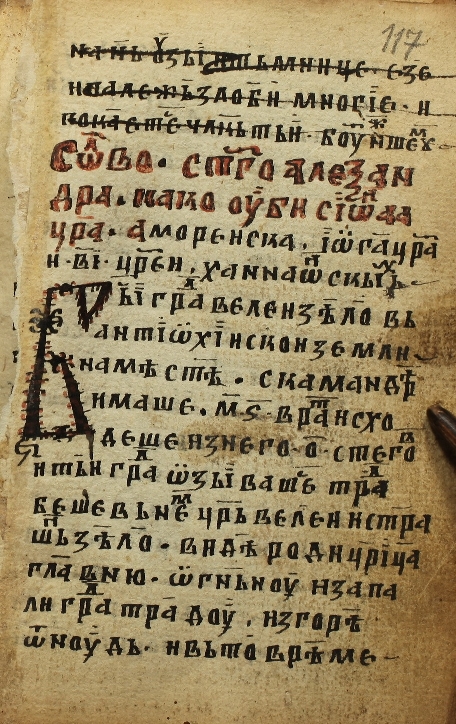 | | page 117r | | 1: | Slwvo. lemma: slovo 'word, homily'
form: n.sg.nom/acc
translation: [Title] Homily on Saint Alexander
stgo lemma: svęt 'saint'
form: m.sg.gen/acc.pron
aleѯan_dra. lemma: Aleksander 'Alexander'
form: m.sg.gen/acc.anim
| | 2: | kako lemma: kako 'how'
form: adverb
translation: [Title] How he slew Sion, king of Amorites and Og, and 12 (other) kings of Canaan
cf. Num 21:33, Ps 135:11
oubi lemma: ubija 'murder, kill'
form: 2/3sg.aor (pf)
sïwnaa lemma: Sion 'Sihon'
form: m.sg.gen/acc.anim
| | 3: | cra. lemma: car 'king, emperor'
form: m.sg.gen/acc.anim
amoreiska. lemma: amoreiski 'Amorite'
form: m.sg.gen/acc
ï+ lemma: i 'and'
form: conjunction
wgà+ lemma: Jug 'Og'
form: m.sg.gen/acc.anim
cra lemma: car 'king, emperor'
form: m.sg.gen/acc.anim
| | 4: | i lemma: i 'and'
form: conjunction
*vï* lemma: 12
form: alphabetic number
crei. lemma: car 'king, emperor'
form: m.pl.gen
xannawnskixь, lemma: xanaanski 'of Canaan'
form: m.pl.gen/loc.pron
| | 5: | Bys lemma: sъm 'be'
form: 2/3sg.aor (pf)
translation: There was a very large city in the land of Antioch, on the place called Skamander
Odessa: anaѳoliskoi
grad lemma: grad 'city'
form: m.sg.nom/acc
velei lemma: velik 'great'
form: m.sg.nom
zě´lò lemma: źělo
form: adverb
vь lemma: v 'in'
form: preposition
| | 6: | antïwxïiskoi+ lemma: antioxiiski 'of Antioch'
form: f.sg.dat.pron
zemli, lemma: zemlja 'land, earth'
form: f.sg.dat/loc
na+ lemma: na 'on, to, for'
form: preposition
městě`. lemma: město 'place'
form: n.sg.loc
skamandrě` lemma: Skamander
form: Nnsmn
River Skamandros/Xanthos (today Karamenderes).
| | 7: | imaše. lemma: imam 'have'
form: 2/3sg.impf (ipf)
translation: it had 46 gates
*mź* lemma: 46
form: alphabetic number
vrat+ lemma: vrata 'door'
form: n.pl.gen
isxo_deše lemma: izxoždam
form: 2/3sg.impf (ipf)
translation: it mustered (an army of) 70 banners
| | 8: | iz+ lemma: iz 'from'
form: preposition
nego lemma: toi 'he'
form: m.3sg.gen/acc (long)
*o* lemma: 70
form: alphabetic number
stegov lemma: stěg 'banner'
form: m.pl.gen
| | 9: | i lemma: i 'and'
form: conjunction
translation: and the city's name was Troas
tьi lemma: tъ 'the'
form: m.sg.nom
grad lemma: grad 'city'
form: m.sg.nom/acc
wzyvaše+ lemma: ozivam
form: 3sg.prs (ipf)
s(e) lemma: se 'self'
form: refl.acc
trda lemma: Troada 'Troas'
form: f.sg.nom
| | 10: | beše+ lemma: sъm 'be'
form: 2/3sg.impf (ipf)
translation: there was a very great and terrible king there
vь+ lemma: v 'in'
form: preposition
nem lemma: toi 'he'
form: f.3sg.dat
crь lemma: car 'king, emperor'
form: m.sg.nom
velèi lemma: velii 'great'
form: m.sg.nom
i+ lemma: i 'and'
form: conjunction
strà_šnь+ lemma: strašen 'terrible'
form: m.sg.nom
| | 11: | zě´lò. lemma: źělo
form: adverb
vidě` lemma: vidja 'see'
form: 2/3sg.aor (ipf)
translation: he saw (a dream) where the queen gave birth to a burning firebrand
rodi+ lemma: rodja 'give birth, beget'
form: 2/3sg.aor (pf)
crïcà lemma: carica 'queen'
form: f.sg.nom
| | 12: | glàvnju lemma: glavnja
form: f.sg.acc
Miklosich: glavьnja 'dalos, titio, drěvo ogorělo'; a sg.acc would be expected - the form of both words is an inst.
wgnь`nou lemma: ognen 'fiery'
form: f.sg.acc
i+ lemma: i 'and'
form: conjunction
translation: and it ignited the city of Troas
zapa_li lemma: zapalja 'ignite'
form: 2/3sg.aor (pf)
| | 13: | grad lemma: grad 'city'
form: m.sg.nom/acc
trádou. lemma: Troada 'Troas'
form: f.sg.acc
izgorě` lemma: izgorja 'burn'
form: 2/3sg.aor (pf)
translation: it burned down totally
| | 14: | wtnudь. lemma: otnǫd 'totally'
form: adverb
Miklosich: otъnǫdъ 'pántōs, omnino'
i+ lemma: i 'and'
form: conjunction
translation: and in that time the queen had a baby in her bosom
vь+ lemma: v 'in'
form: preposition
tò+ lemma: to 'that, then'
form: particle
vrě´me- lemma: vrěme
form: n.sg.nom/acc
|
|
|
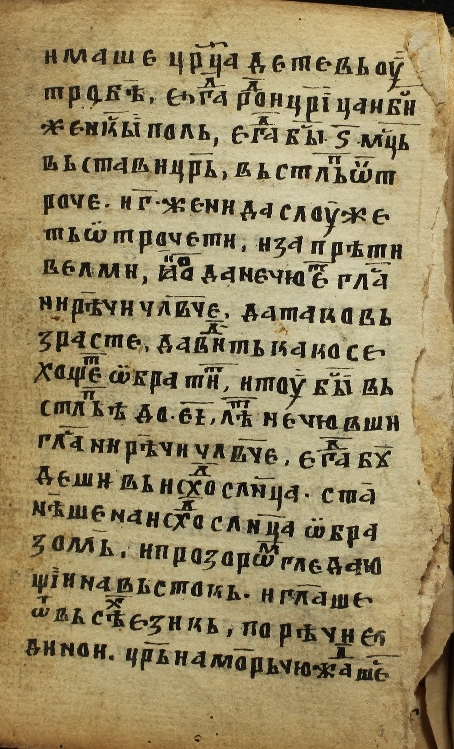 | | page 117v | | 1: | imaše lemma: imam 'have'
form: 2/3sg.impf (ipf)
crca lemma: carica 'queen'
form: f.sg.nom
dete lemma: dete 'child'
form: n.sg.nom/acc
vь+ lemma: v 'in'
form: preposition
ou_trobě`. lemma: utroba 'womb, bowels'
form: f.sg.dat/loc
| | 2: | egda lemma: egda 'when'
form: relative
translation: when she gave birth, it was a girl
rodi+ lemma: rodja 'give birth, beget'
form: 2/3sg.aor (pf)
crïca lemma: carica 'queen'
form: f.sg.nom
i lemma: toi 'he'
form: m.3sg.gen/acc (long)
Redundant cc
bis lemma: sъm 'be'
form: 2/3sg.aor (pf)
| | 3: | žensky lemma: ženski 'female'
form: m.sg.nom.pron
polь, lemma: pol 'sex, half'
form: m.sg.nom/acc
egda lemma: egda 'when'
form: relative
translation: when the child was 6 months old, the king imprisoned it in a tower with three mute women to serve her
bys lemma: sъm 'be'
form: 2/3sg.aor (pf)
*ź* lemma: 6
form: alphabetic number
mscь lemma: mesec 'month'
form: m.pl.gen
| | 4: | vьstavi+ lemma: vъstavja
form: 2/3sg.aor (pf)
crь, lemma: car 'king, emperor'
form: m.sg.nom
vь+ lemma: v 'in'
form: preposition
stlьp lemma: stъlp 'pillar'
form: m.sg.nom/acc
Odessa: stlьpě
wt_roče. lemma: otroče 'child, baby'
form: n.sg.nom/acc
| | 5: | i+ lemma: i 'and'
form: conjunction
*g* lemma: 3
form: alphabetic number
ženi+ lemma: žena 'woman'
form: f.pl.nom/acc
da+ lemma: da 'to'
form: conjunction
služe_tь lemma: služa 'serve'
form: 3sg.prs (ipf)
| | 6: | wtročeti. lemma: otroče 'child, baby'
form: f.3sg.dat
i+ lemma: i 'and'
form: conjunction
translation: and he strictly prevented her from hearing neither voice nor words of humans
zaprěti lemma: zapretja 'forbid'
form: 2/3sg.aor (pf)
| | 7: | velmi, lemma: velmi
form: adverb
jako lemma: jako (2) 'as'
form: conjunction
da+ lemma: da 'to'
form: conjunction
ne+ lemma: ne 'no, not'
form: negation particle
čjuet lemma: čuja 'hear'
form: 3sg.prs (ipf)
glas lemma: glas 'voice, tone'
form: m.sg.nom/acc
| | 8: | ni+ lemma: ni 'nor'
form: conjunction
rě´či lemma: reč 'word'
form: f.sg.gen
člvče, lemma: člověčii
form: f.sg.gen
da+ lemma: da 'to'
form: conjunction
translation: to have her grow like that
tako+ lemma: tako
form: relative
vь_zraste, lemma: vъzъrastja
form: 3sg.prs (pf)
| | 9: | da lemma: da 'to'
form: conjunction
translation: to make her not see (any help) to turn for
vditь+ lemma: vidja 'see'
form: 3sg.prs (ipf)
kako+ lemma: kamo 'where'
form: interrogative
se lemma: se 'self'
form: refl.acc
| | 10: | xoštet lemma: xotěti 'want'
form: 3sg.prs (ipf)
wbratit(i), lemma: obraštam 'turn'
form: infinitive (pf)
i+ lemma: i 'and'
form: conjunction
translation: and thus she was for 15 years in the tower
tou lemma: tu 'there'
form: relative
bys lemma: sъm 'be'
form: 2/3sg.aor (pf)
vь lemma: v 'in'
form: preposition
| | 11: | stlьpě lemma: stъlp 'pillar'
form: m.sg.loc
do lemma:
form:
*eï* lemma: 15
form: alphabetic number
lět lemma: lěto 'summer, year'
form: n.pl.gen
ne+ lemma: ne 'no, not'
form: negation particle
translation: without having heard a voice or words of humans
čuv'ši lemma: čuja 'hear'
form: ptcp.aor.act
alt.analysis: f.sg.nom
| | 12: | glas lemma: glas 'voice, tone'
form: m.sg.nom/acc
ni lemma: ni 'nor'
form: conjunction
rě´či lemma: reč 'word'
form: f.sg.gen
člvče, lemma: člověčii
form: f.sg.gen
egda lemma: egda 'when'
form: relative
translation: at the dawn she stood up towards the east with face
bu_deši lemma: sъm 'be'
form: 2sg.prs (pf)
Adžar: boúděše, Odessa: běše
| | 13: | vь+ lemma: v 'in'
form: preposition
isxod+ lemma: isxod
form: m.sg.nom/acc
slnca. lemma: slъnce 'sun'
form: n.sg.gen
stà_ně´še+ lemma: stana 'become, stand up'
form: 2/3sg.impf (pf)
| | 14: | na+ lemma: na 'on, to, for'
form: preposition
isxod+ lemma: vъstok 'East'
form: m.sg.nom/acc
slnca lemma: slъnce 'sun'
form: n.sg.gen
wbra_zomь`. lemma: obraz 'picture'
form: m.sg.inst
| | 15: | i+ lemma: i 'and'
form: conjunction
translation: and, looking from the window, she spoke from all the languages by one word
prozorwm lemma: prozor
form: m.sg.inst
gledaju_štii+ lemma: gledam 'watch'
form: ptcp.prs.act
alt.analysis: f.sg.nom
| | 16: | na+ lemma: na 'on, to, for'
form: preposition
vьstokь. lemma: vъztok
form: m.sg.nom/acc
i+ lemma: i 'and'
form: conjunction
glaše lemma: glagolati 'speak'
form: 2/3sg.impf (ipf)
| | 17: | wt+ lemma: ot 'from'
form: preposition
vьsěx+ lemma: vse 'all'
form: m.pl.gen/loc.pron
ezikь, lemma: ezik 'language, tongue'
form: m.pl.gen
po lemma: po 'after, along, according to'
form: preposition
rěči lemma: reč 'word'
form: f.sg.dat/loc
e_dinoi. lemma: edin 'one'
form: f.sg.dat.pron
| | 18: | crь+ lemma: car 'king, emperor'
form: m.sg.nom
translation: king Amor wondered
iamórь+ lemma: Amor
form: m.sg.nom
Unclear, whether it should be read as iamorь or crь+ i+ amorь. The first would be logical from the point of narrative, even if uncommon in the text tradition. Given the forms like bolari (and below even jaleѯandri), it is likely that /ja/ and /a/ were not clearly distinguished in the editor's vernacular.
The name of the Tale's "Priam", the king of Troas, has been much discussed. Močuľskij (1893:375) considered it an influence of the Legend of Diogenēs Akritēs, where a "King Amir" (Amēras) plays a central role. Mazon (1942:17-20) mentions more possible explanations: e.g. Homer himself, or, following the preferrence for biblical names, Hamor the Hivite, the ruler of Shechem in Canaan (Gen 33:19). He could be also the "king of Amorites" (Amorrhaios in Gen 10:16, tr. in some CS texts as amorěiskii carь, according to Mazon).
čjuždaše+ lemma: čudja 'wonder'
form: 2/3sg.impf (ipf)
s(e) lemma: se 'self'
form: refl.acc
|
|
|
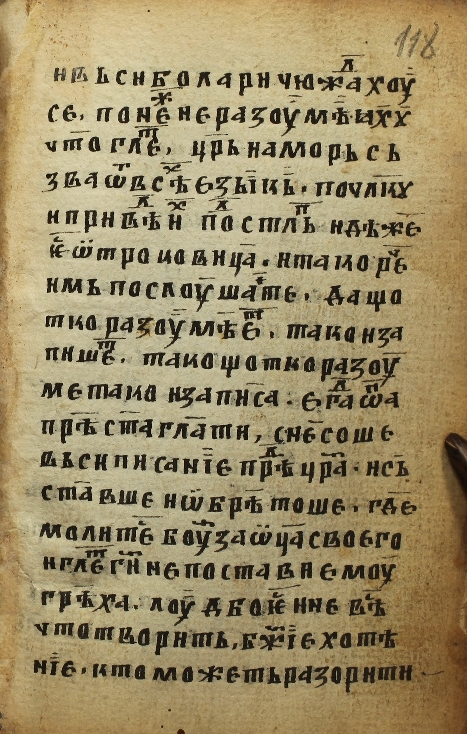 | | page 118r | | 1: | i+ lemma: i 'and'
form: conjunction
translation: and all the boyars wondered
vьsi+ lemma: vse 'all'
form: m.pl.nom
bolari lemma: boljarin 'boyar, noble'
form: m.pl.nom
čjuždaxou lemma: čudja 'wonder'
form: 3pl.aor/impf (ipf)
| | 2: | se, lemma: se 'self'
form: refl.acc
ponže+ lemma: poneže 'because'
form: conjunction
translation: because they did not understand, what she speaks
ne+ lemma: ne 'no, not'
form: negation particle
razoumějaxù lemma: razuměja
form: 3pl.aor/impf (ipf)
| | 3: | čtò lemma: čьto
form: nom
glet, lemma: glagolati 'speak'
form: 3sg.prs (ipf)
crь lemma: car 'king, emperor'
form: m.sg.nom
translation: and the king collected people from all nations
iamorь lemma: Amor
form: m.sg.nom
sь_zva+ lemma: sъzvati
form: 2/3sg.aor (pf)
| | 4: | wt+ lemma: ot 'from'
form: m.sg.nom
vsěx+ lemma: vse 'all'
form: m.pl.gen/loc.pron
ezykь. lemma: ezik 'language, tongue'
form: m.pl.gen
po+ lemma: po 'after, along, according to'
form: preposition
člku lemma: člověk
form: m.sg.dat
| | 5: | i+ lemma: i 'and'
form: conjunction
translation: and he brought them beneath the tower, where the girl was (imprisoned)
privdě+ lemma: priveda 'lead in'
form: 2/3sg.aor (pf)
ix lemma: tě 'they'
form: 3pl.gen/acc (short)
pod+ lemma: pod 'under'
form: preposition
stlьp lemma: stъlp 'pillar'
form: m.sg.nom/acc
iděže lemma: ideže 'where'
form: relative
| | 6: | jes lemma: sъm 'be'
form: 2/3sg.impf (ipf)
wtrokovicà. lemma: otrokovica
form: f.sg.nom
i+ lemma: i 'and'
form: conjunction
translation: and he said to them:
tako lemma: tako
form: relative
rče lemma: reka 'say'
form: 2/3sg.aor (pf)
| | 7: | imь lemma: tě 'they'
form: 3pl.dat
posloúšaïte. lemma: poslušam 'obey, listen'
form: 2pl.imp (pf)
translation: listen!
da+ lemma: ta 'and, thus'
form: conjunction
translation: and write what you hear and understand
što lemma: što 'what'
form: nom
| | 8: | tko lemma: tko
form: nom
SC?
razumě`et, lemma: razuměja
form: 2pl.prs (ipf)
tako+ lemma: tako
form: relative
i+ lemma: i 'and'
form: conjunction
za_pišet. lemma: napiša 'write'
form: 2pl.imp (pf)
| | 9: | tako+ lemma: tako
form: relative
translation: thus they wrote, what they understood
što+ lemma: što 'what'
form: nom
tko+ lemma: tko
form: nom
SC?
razoú_me+ lemma: razuměja
form: 2/3sg.aor (ipf)
| | 10: | tako lemma: tako
form: relative
i+ lemma: i 'and'
form: conjunction
zapísa. lemma: zapiša 'write down'
form: 3pl.aor (pf)
egda+ lemma: egda 'when'
form: relative
translation: when she stopped speaking, they all brought what they wrote to the king
wna lemma: on 'he'
form: f.pl.nom
| | 11: | prě´stà lemma: prestana 'cease'
form: 2/3sg.aor (pf)
glati, lemma: glagolati 'speak'
form: infinitive (ipf)
snésoše lemma: iznesa 'carry out'
form: 3pl.aor (pf)
| | 12: | vьsi+ lemma: vse 'all'
form: m.pl.nom
pisanïe lemma: pisanie 'letter, scripture'
form: n.sg.nom/acc
prěd+ lemma: pred 'in front'
form: preposition
cra. lemma: car 'king, emperor'
form: m.sg.gen/acc.anim
i+ lemma: i 'and'
form: conjunction
translation: and having collected it, they found out that ("where") she was praying for her father
sь`_stàvše lemma: sъstavja 'rebuild'
form: ptcp.aor.act
alt.analysis: m.pl.nom
| | 13: | i+ lemma: i 'and'
form: conjunction
wbrě´toše, lemma: obrěsti 'find'
form: 3pl.aor (pf)
gdè. lemma: gde 'where'
form: interrogative
| | 14: | molite+ lemma: molja 'pray'
form: 2pl.prs (ipf)
Adžar: mlit, Odessa: mlet
s(e) lemma: se 'self'
form: refl.acc
bou+ lemma: bog 'god'
form: m.sg.dat
za+ lemma: za 'for, about'
form: preposition
wca+ lemma: otec 'father'
form: m.sg.gen/acc.anim
svoego lemma: svoi 'of oneself'
form: m.sg.gen/acc.pron
| | 15: | i+ lemma: i 'and'
form: conjunction
translation: and (that) she speaks:
glet lemma: glagolati 'speak'
form: 3sg.prs (ipf)
gi+ lemma: Gospod 'Lord'
form: m.sg.voc
translation: o Lord, do not count this sin of his
ne+ lemma: ne 'no, not'
form: negation particle
postavi lemma: postavja 'place, build'
form: 2sg.imp (pf)
emoú lemma: toi 'he'
form: m.3sg.dat
| | 16: | grě´xa. lemma: grěx 'sin'
form: m.sg.gen
loud+ lemma: lud 'mad'
form: m.sg.nom
translation: for he is mad
bo+ lemma: bo 'because'
form: conjunction
jes lemma: sъm 'be'
form: 3sg.prs (ipf)
i+ lemma: i 'and'
form: conjunction
translation: and he does not know, what is he doing
ne lemma: ne 'no, not'
form: negation particle
věs lemma: věděti 'know'
form: 3sg.prs (ipf)
| | 17: | čto+ lemma: čьto
form: nom
tvoritь, lemma: tvorja 'do, create'
form: 3sg.prs (ipf)
bžïe+ lemma: božii 'Godʹs'
form: n.sg.nom/acc.pron
translation: who can destroy the will of God?
xotě_nie, lemma: xotěnie 'lust'
form: n.sg.nom/acc
| | 18: | kto lemma: kto
form: nom
možetь+ lemma: moga 'can'
form: 3sg.prs (ipf)
razoriti, lemma: razuměriti
form: infinitive (pf)
Odessa: razuměriti
|
|
|
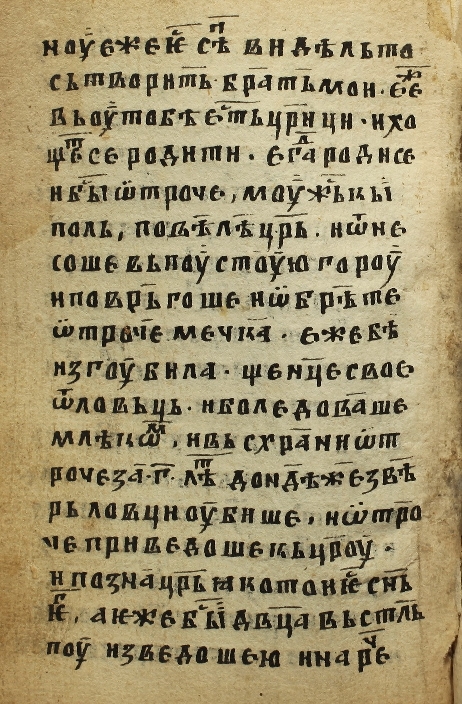 | | page 118v | | 1: | nou lemma: nъ
form: conjunction
translation: but what he had seen in the dream, that shall be done by my brother
eže+ lemma: iže 'who'
form: n.sg.nom
jes lemma: sъm 'be'
form: 3sg.prs (ipf)
sně lemma: sъn 'slumber, dream'
form: m.sg.loc
Prepositionless locative?
vidělь+ lemma: vidja 'see'
form: l-ptcp (ipf)
to lemma: to 'that, then'
form: particle
| | 2: | sьtvoritь` lemma: sъtvorja 'create, do'
form: 3sg.prs (pf)
bràtь`+ lemma: brat 'brother'
form: m.sg.nom
moi. lemma: moi 'my'
form: m.sg.nom.pron
eže lemma: iže 'who'
form: n.sg.nom
translation: who lays in the bosom of the Queen
| | 3: | vь lemma: v 'in'
form: preposition
outrobě lemma: utroba 'womb, bowels'
form: Nfsln
estь+ lemma: sъm 'be'
form: 3sg.prs (ipf)
crici. lemma: carica 'queen'
form: f.sg.dat/loc
i+ lemma: i 'and'
form: conjunction
translation: and who will be born
xo_štet lemma: xotěti 'want'
form: 3sg.prs (ipf)
| | 4: | se lemma: se 'self'
form: refl.acc
roditi. lemma: rodja 'give birth, beget'
form: infinitive (pf)
egda+ lemma: egda 'when'
form: relative
translation: when the Queen gave birth, it was a boy
rodi+ lemma: rodja 'give birth, beget'
form: 2/3sg.aor (pf)
se lemma: se 'self'
form: refl.acc
| | 5: | i+ lemma: i 'and'
form: conjunction
bys+ lemma: sъm 'be'
form: 2/3sg.aor (pf)
wtroče, lemma: otroče 'child, baby'
form: n.sg.nom/acc
mužьsky lemma: mužъski
form: m.sg.nom
| | 6: | polь, lemma: pol 'sex, half'
form: m.sg.nom/acc
pově´lě´+ lemma: povelja 'give an order'
form: 2/3sg.aor (pf)
translation: the king commanded
crь lemma: car 'king, emperor'
form: m.sg.nom
i+ lemma: i 'and'
form: conjunction
translation: and they brought him to deserted mountains
wtne_soše lemma: otnesa 'carry out'
form: 3pl.aor (pf)
| | 7: | vь+ lemma: v 'in'
form: preposition
poustouju lemma: pust 'deserted'
form: f.sg.acc.pron
Why a long form?
Odessa: pustïe gory
gorou lemma: gora 'forest'
form: f.sg.acc
| | 8: | i+ lemma: i 'and'
form: conjunction
translation: and they threw him away
povrь`goše lemma: povrъzti
form: 3pl.aor (pf)
i+ lemma: i 'and'
form: conjunction
translation: and the child was found by a bear, which had lost its cub to hunters and had much milk
wbrě´te lemma: obrěsti 'find'
form: 2/3sg.aor (pf)
| | 9: | wtročè lemma: otroče 'child, baby'
form: n.sg.nom/acc
mečkà. lemma: mečka 'bear'
form: f.sg.nom
eže+ lemma: iže 'who'
form: n.sg.nom
bě lemma: sъm 'be'
form: 2/3sg.impf (ipf)
| | 10: | izьgoúbila. lemma: izъgubiti
form: l-ptcp (pf)
štencè+ lemma: štence
form: n.sg.nom/acc
svoe lemma: svoi 'of oneself'
form: n.sg.nom/acc.pron
| | 11: | wt+ lemma: ot 'from'
form: preposition
lovьcь. lemma: lovec
form: m.pl.gen
i+ lemma: i 'and'
form: conjunction
boledovaše lemma: bolěxuvati
form: 2/3sg.impf (ipf)
| | 12: | mlěkwm, lemma: mlěko 'milk'
form: n.sg.inst
i+ lemma: i 'and'
form: conjunction
translation: and (the bear) fed the child for 3 years
vьsxráni+ lemma: vъzxranja
form: 2/3sg.aor (pf)
wt_roče+ lemma: otroče 'child, baby'
form: n.sg.nom/acc
| | 13: | za lemma: za 'for, about'
form: preposition
*g* lemma: 3
form: alphabetic number
lět lemma: lěto 'summer, year'
form: n.pl.gen
dondežè+ lemma: dondeže
form: relative
translation: until the beast was killed by hunters
zvě_rь lemma: zvěr 'beast'
form: m.sg.nom
| | 14: | lovci+ lemma: lovec
form: m.pl.nom
oubiše, lemma: ubija 'murder, kill'
form: 3pl.aor (pf)
i lemma: i 'and'
form: conjunction
translation: and they brought the child to the king
wtrò_če lemma: otroče 'child, baby'
form: n.sg.nom/acc
| | 15: | privedoše+ lemma: priveda 'lead in'
form: 3pl.aor (pf)
kь+ lemma: k 'to'
form: preposition
crou. lemma: car 'king, emperor'
form: m.sg.dat
| | 16: | i+ lemma: i 'and'
form: conjunction
translation: and the king recognized his son
poznà+ lemma: poznaja 'know, understand'
form: 2/3sg.aor (pf)
crь lemma: car 'king, emperor'
form: m.sg.nom
jako+ lemma: jako (2) 'as'
form: conjunction
toi+ lemma: tъ 'the'
form: m.sg.nom
jes+ lemma: sъm 'be'
form: 3sg.prs (ipf)
snь lemma: sin 'son'
form: m.sg.nom
| | 17: | jeg, lemma: toi 'he'
form: m.3sg.gen/acc (long)
a+ lemma: a 'and, but'
form: conjunction
translation: and they freed the maiden, which was in the tower
ježe+ lemma: iže 'who'
form: n.sg.nom
bys+ lemma: sъm 'be'
form: 2/3sg.aor (pf)
dvca lemma: děvica
form: f.sg.nom
vь+ lemma: v 'in'
form: preposition
stlь_pou lemma: stъlp 'pillar'
form: m.sg.dat
SC? Originally an o-stem, other editions also have stlьpě, in OCS we have sg.gen stlъpa
Adžar/Odessa: stlь´pě
| | 18: | izvedoše+ lemma: izveda 'lead out'
form: 3pl.aor (pf)
ju lemma: tja 'she'
form: f.3sg.acc (short)
i+ lemma: i 'and'
form: conjunction
translation: and they gave her name Magdona
narče lemma: nareka 'call'
form: 3pl.aor (pf)
|
|
|
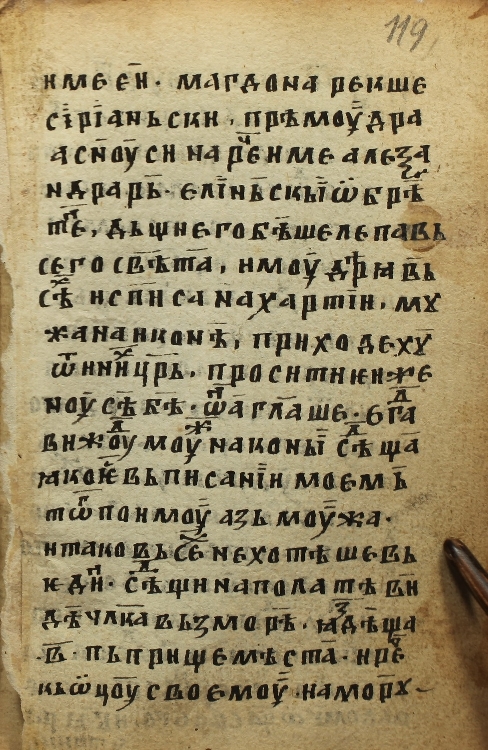 | | page 119r | | 1: | ime lemma: ime 'name'
form: n.sg.nom/acc
eì. lemma: tja 'she'
form: f.3sg.dat
magdona lemma: Magdona
form: f.sg.nom
rekše lemma: reka 'say'
form: ptcp.aor.act
alt.analysis: n.sg.nom/acc
translation: which means 'most wise' in Syriac
| | 2: | sïrïanьski, lemma: sirejanski
form: adverb
prěmoudra. lemma: prěmudъr
form: f.sg.nom
| | 3: | a+ lemma: a 'and, but'
form: conjunction
translation: and they called the son Alexander
snoú+ lemma: sin 'son'
form: m.sg.dat
alt.analysis: m.sg.gen/acc.anim
A u-stem should have -ovi
thus in Odessa too, Adžar has emu
si lemma: se 'self'
form: refl.dat
na_rče lemma: nareka 'call'
form: 2/3sg.aor (pf)
ime lemma: ime 'name'
form: n.sg.nom/acc
aleѯa_ndrarь´. lemma: Aleksander 'Alexander'
form: m.sg.nom
| | 4: | elïnь´sky+ lemma: elinski 'of pagans, Greeks'
form: adverb
translation: (which means) 'a found one' in Greek
wbrě_ten, lemma: obrěsti 'find'
form: m.sg.nom
alt.analysis: ptcp.aor.pass (pf)
| | 5: | dьšti+ lemma: dъšti
form: f.sg.nom
translation: his daughter was the (most) beautiful and most wise in the whole world
Adžar: dьšti ego bě lěpa i prěmudra źělô. páče vьsěx velíko
ego+ lemma: toi 'he'
form: m.3sg.gen/acc (long)
bě´še+ lemma: sъm 'be'
form: 2/3sg.impf (ipf)
lepa+ lemma: lěp 'beautiful'
form: f.sg.nom
vь_sego lemma: vse 'all'
form: m.sg.gen/acc.pron
| | 6: | svě`tà, lemma: svět 'world, light'
form: m.sg.gen
i+ lemma: i 'and'
form: conjunction
moúdrěja+ lemma: mudъr
form: f.sg.nom.comp.pron
OCS-kosher would be *mǫdrěiši
Adžar: prěmudra, Odessa: mudrei
vь`_sěx lemma: vse 'all'
form: m.pl.gen/loc.pron
| | 7: | i+ lemma: i 'and'
form: conjunction
translation: and she drew on a paper a man on an icon
spìsa+ lemma: sъpiša 'write down'
form: 2/3sg.aor (pf)
na+ lemma: na 'on, to, for'
form: preposition
xartïi, lemma: xartija 'paper'
form: f.sg.dat/loc
mu_ža lemma: mъž 'man'
form: m.sg.gen/acc.anim
| | 8: | na lemma: na 'on, to, for'
form: preposition
ikoně, lemma: ikona 'icon'
form: f.sg.dat/loc
Adžar: na koni, Odessa: na kony (sic)
prixodexù lemma: prixoždam 'come'
form: 3pl.aor/impf (ipf)
translation: other kings were coming
| | 9: | wt+ lemma: ot 'from'
form: preposition
inix lemma: in 'another, different'
form: m.pl.gen/loc.pron
crь, lemma: car 'king, emperor'
form: m.pl.gen
Sentence is unclear due to the unclear subject: maybe *ljudie/pisania ot iněx carei 'people/messages from other kings'? The shortened cri could stand for both pl.nom and gen (and also acc, inst...). Adžar has a corrupted pl.gen-loc phrase here (wt inix crex').
prositi+ lemma: prosja 'beg, ask'
form: infinitive (pf)
translation: to ask her to become their wife
Possibly a misunderstood supine?
Adžar: xotexu ju poeti, Odessa: prosexo
jei lemma: tja 'she'
form: f.3sg.acc (short)
že_nou lemma: žena 'woman'
form: f.sg.gen
The use of sg.gen (< *ženy) is regular (cf. Lunt 2001:145). Adžar has sg.acc (xotěxu ju poeti sebě crcu) due to a different verb.
| | 10: | sě´bě`. lemma: se 'self'
form: refl.gen/acc
wnà lemma: on 'he'
form: f.sg.nom
translation: (but) she spoke:
glaše. lemma: glagolati 'speak'
form: 2/3sg.impf (ipf)
egda lemma: egda 'when'
form: relative
translation: when I will see a man riding on a horse, like in my drawing
| | 11: | viždou lemma: vidja 'see'
form: 1sg.prs (ipf)
mouž+ lemma: mъž 'man'
form: m.sg.nom
Odessa: muža
na+ lemma: na 'on, to, for'
form: preposition
kony lemma: kon 'horse'
form: m.sg.loc
sědštà lemma: sedja 'sit'
form: ptcp.prs.act
alt.analysis: m.sg.gen/acc
| | 12: | jako+ lemma: jakože 'as well as'
form: conjunction
jes+ lemma: sъm 'be'
form: 3sg.prs (ipf)
vь+ lemma: v 'in'
form: preposition
pisanïi lemma: pisanie 'letter, scripture'
form: n.sg.loc
moemь` lemma: moi 'my'
form: n.sg.loc.pron
| | 13: | tgw+ lemma: tъ 'the'
form: m.sg.gen/acc
translation: that one I will take (for) a husband
poimou lemma: poęti
form: 1sg.prs (pf)
azь lemma: az 'I'
form: 1sg.nom
muža. lemma: mъž 'man'
form: m.sg.gen/acc.anim
| | 14: | i+ lemma: i 'and'
form: conjunction
translation: and thus she rejected all
tako lemma: tako
form: relative
vьsex+ lemma: vse 'all'
form: m.pl.gen/loc.pron
ne+ lemma: ne 'no, not'
form: negation particle
xotěše+ lemma: xotěti 'want'
form: ptcp.prs.act
alt.analysis: n.sg.nom/acc
vь lemma: v 'in'
form: preposition
translation: as she sat in the palace one (day), she saw a man riding out of the sea, about two fathoms from the place
| | 15: | jedin. lemma: edin 'one'
form: m.sg.nom
sědšti+ lemma: sedja 'sit'
form: Vmm-si
alt.analysis: f.sg.nom
na+ lemma: na 'on, to, for'
form: preposition
polatě lemma: polata 'palace'
form: f.sg.dat/loc
vì_dě+ lemma: vidja 'see'
form: 2/3sg.aor (ipf)
| | 16: | člka+ lemma: člověk
form: m.sg.gen/acc.anim
vьz+ lemma: vъz 'over'
form: preposition
morě´. lemma: more 'sea'
form: n.sg.nom/acc
jazdě´šta lemma: jazdja 'ride'
form: ptcp.prs.act
alt.analysis: m.sg.gen/acc
| | 17: | *v* lemma: 2
form: alphabetic number
pьprište lemma: pъprište 'stadium (distance), mile'
form: n.sg.nom/acc
A dual would be expected, likely replaced by the pl form already. Possibly misinterpreted as preposition?
mestá. lemma: město 'place'
form: n.sg.gen
i+ lemma: i 'and'
form: conjunction
translation: and she said to her father, king Amor:
rče lemma: reka 'say'
form: 2/3sg.aor (pf)
| | 18: | kь+ lemma: k 'to'
form: preposition
wcoù+ lemma: otec 'father'
form: m.sg.dat
svoemu lemma: svoi 'of oneself'
form: m.sg.dat.pron
iamoru- lemma: Amor
form: m.sg.dat
|
|
|
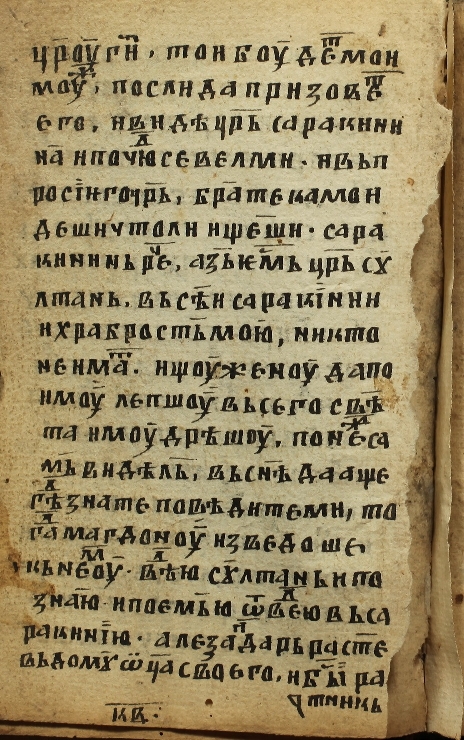 | | page 119v | | 1: | cru+ lemma: car 'king, emperor'
form: m.sg.dat
gi, lemma: gospodin 'lord'
form: m.sg.voc
translation: o lord, that shall be my husband
toi+ lemma: tъ 'the'
form: m.sg.nom
boúdet+ lemma: bъda 'become'
form: 3sg.prs (pf)
moi lemma: moi 'my'
form: m.sg.nom.pron
| | 2: | mouž, lemma: mъž 'man'
form: m.sg.nom
posli+ lemma: poslati 'send'
form: 2sg.imp (pf)
translation: send to him (messengers?) to invite him in
da+ lemma: da 'to'
form: conjunction
prizovet lemma: prizvati
form: 3pl.prs (pf)
| | 3: | ego, lemma: toi 'he'
form: m.3sg.gen/acc (long)
i+ lemma: i 'and'
form: conjunction
translation: and the king saw a Saracen
Adžar: i vědě crь sarakina, Bucharest: i vidě crь sarakyninę
vidě+ lemma: vъniti 'enter'
form: 2/3sg.aor (pf)
crь lemma: car 'king, emperor'
form: m.sg.nom
sarakini_nà lemma: sarakinin
form: m.sg.gen/acc.anim
gr. sarakēnos < ar. šarqīyīn 'Eastern'
| | 4: | i+ lemma: i 'and'
form: conjunction
translation: and he wondered a lot
počjud+ lemma: počudja 'wonder'
form: 2/3sg.aor (pf)
se+ lemma: se 'self'
form: refl.acc
velmi. lemma: velmi
form: adverb
i+ lemma: i 'and'
form: conjunction
translation: and the king asked him:
vьp_rosï+ lemma: vъprosja
form: 2/3sg.aor (pf)
| | 5: | jego+ lemma: toi 'he'
form: m.3sg.gen/acc (long)
crь, lemma: car 'king, emperor'
form: m.sg.nom
bràte+ lemma: brat 'brother'
form: m.sg.voc
translation: o brother, where do you go?
kamo lemma: kamo 'where'
form: adverb
alt.analysis: Pq---a
i_deši+ lemma: ida 'go'
form: 2sg.prs (ipf)
| | 6: | čto+ lemma: čьto
form: nom
translation: or what do you want?
li lemma: li '(question particle)'
form: interrogative particle
išteši lemma: iskam 'want'
form: 2sg.prs (ipf)
sara_kininь lemma: sarakinin
form: m.sg.nom
translation: the Saracen said:
| | 7: | rče, lemma: reka 'say'
form: 2/3sg.aor (pf)
azь+ lemma: az 'I'
form: 1sg.nom
translation: I am king Sultan of all Saracenia
jesmь lemma: sъm 'be'
form: 1sg.prs (ipf)
crь lemma: car 'king, emperor'
form: m.sg.nom
sú_ltanь, lemma: Sultan
form: m.sg.nom
| | 8: | vьsě´i lemma: vse 'all'
form: f.sg.dat.pron
sarakïnii lemma: Sarakinia
form: f.sg.gen
| | 9: | i+ lemma: i 'and'
form: conjunction
translation: and no one has my bravery
xrábrostь`+ lemma: xrabrost
form: f.sg.nom
mojú, lemma: moi 'my'
form: f.sg.acc.pron
nikto lemma: nikto
form: nom
| | 10: | ne lemma: ne 'no, not'
form: negation particle
imat. lemma: imam 'have'
form: 3sg.prs (ipf)
ištoú+ lemma: iskam 'want'
form: 1sg.prs (ipf)
translation: I want to marry the wisest and most beautiful woman of all the world
Adžar: i íštu žénu da+ poímu sébě lě´pu í mudru páče vьsěx velíko
ženoú lemma: žena 'woman'
form: f.sg.acc
da+ lemma: da 'to'
form: conjunction
po_imou lemma: poema 'take'
form: 1sg.prs (pf)
| | 11: | lepšou lemma: lěp 'beautiful'
form: f.sg.acc.comp
vьsego lemma: vse 'all'
form: m.sg.gen/acc.pron
svě´_ta lemma: svět 'world, light'
form: m.sg.gen
| | 12: | i+ lemma: i 'and'
form: conjunction
moúdrěšoú, lemma: mъdъr 'wise'
form: f.sg.acc.comp
ponže+ lemma: poneže 'because'
form: conjunction
translation: because I have seen such one in a dream by himself
sa_mь´ lemma: sam 'alone'
form: m.sg.nom
| | 13: | vidělь´, lemma: vidja 'see'
form: l-ptcp (ipf)
vь+ lemma: v 'in'
form: preposition
sně`+ lemma: sъn 'slumber, dream'
form: m.sg.loc
da+ lemma: da 'to'
form: conjunction
translation: so if you know where (there is one), tell me
ašte lemma: ašte 'if'
form: conjunction
| | 14: | gdě+ lemma: gde 'where'
form: interrogative
znate lemma: znaja 'know'
form: 2pl.prs (ipf)
povědite+ lemma: povědati 'tell'
form: 2pl.imp (pf)
mi, lemma: az 'I'
form: 1sg.dat
to_gda+ lemma: togda 'then'
form: relative
translation: then they led Magdona to him
| | 15: | magdonou lemma: Magdona
form: f.sg.acc
izvedoše lemma: izveda 'lead out'
form: 2/3sg.impf (ipf)
| | 16: | kь+ lemma: k 'to'
form: preposition
nemoú. lemma: toi 'he'
form: m.3sg.dat
vdě+ lemma: vidja 'see'
form: 2/3sg.aor (pf)
translation: Sultan saw her
ju lemma: tja 'she'
form: f.3sg.acc (short)
súltanь+ lemma: Sultan
form: m.sg.nom
i+ lemma: i 'and'
form: conjunction
translation: and he knew her
po_zna+ lemma: poznaja 'know, understand'
form: 2/3sg.aor (pf)
| | 17: | jù. lemma: tja 'she'
form: f.3sg.acc (short)
i+ lemma: i 'and'
form: conjunction
translation: and having taken her, he brought her to Saracenia
poemь´+ lemma: poęti
form: ptcp.aor.act
alt.analysis: n.sg.nom/acc
ju lemma: tja 'she'
form: f.3sg.acc (short)
wtvde+ lemma: otveda 'lead away'
form: 2/3sg.aor (pf)
ju+ lemma: tja 'she'
form: f.3sg.acc (short)
vь+ lemma: v 'in'
form: preposition
sa_rakinïju lemma: Sarakinia
form: f.sg.acc
| | 18: | аleѯandarь+ lemma: Aleksander 'Alexander'
form: m.sg.nom
translation: Alexander grew up in the house of his fater
SC?
rastè lemma: rastja 'grow'
form: 2/3sg.aor (ipf)
| | 19: | vь+ lemma: v 'in'
form: preposition
domù+ lemma: dom 'house'
form: m.sg.dat
alt.analysis: m.sg.gen
The old u-stem ending is in all versions.
wca lemma: otec 'father'
form: m.sg.gen/acc.anim
svoego. lemma: svoi 'of oneself'
form: m.sg.gen/acc.pron
i+ lemma: i 'and'
form: conjunction
translation: and he became the (strongest) warrior of all the nations and a king for all nations
bys+ lemma: sъm 'be'
form: 2/3sg.aor (ipf)
ratnikь lemma: ratnik
form: m.sg.nom
|
|
|
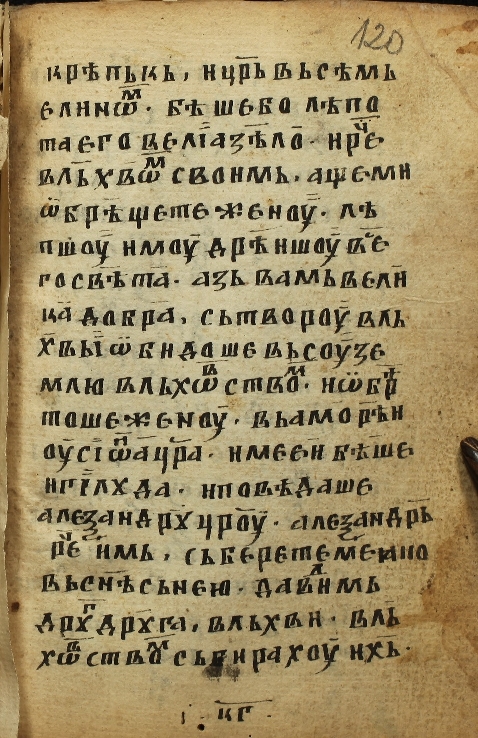 | | page 120r | | 1: | krěpьkь, lemma: krěpъk
form: m.sg.nom
i+ lemma: i 'and'
form: conjunction
crь+ lemma: car 'king, emperor'
form: m.sg.nom
vьsěmь lemma: vse 'all'
form: m.pl.dat.pron
| | 2: | elinwm. lemma: elinin 'pagan, Greek'
form: m.pl.dat
beše lemma: sъm 'be'
form: 2/3sg.impf (ipf)
translation: And his beauty was very great.
bo lemma: bo 'because'
form: conjunction
lěpo_ta+ lemma: lěpota 'beauty'
form: f.sg.nom
| | 3: | ego lemma: toi 'he'
form: m.3sg.dat
velïa lemma: velii 'great'
form: f.sg.nom.pron
zě´ló. lemma: i 'and'
form: conjunction
i+ lemma: i 'and'
form: conjunction
translation: And he told his wizards:
rče lemma: reka 'say'
form: 2/3sg.aor (pf)
| | 4: | vlь´xvwm lemma: vlъxvъ 'magician'
form: m.pl.dat
svoim. lemma: svoi 'of oneself'
form: m.pl.dat.pron
ašte+ lemma: ašte 'if'
form: conjunction
translation: If you will find me the most beautiful and intelligent woman in the world, I will do a great good to you
mi lemma: az 'I'
form: 1sg.dat
| | 5: | wbrě´štete+ lemma: obrěsti 'find'
form: 2pl.prs (pf)
ženou. lemma: žena 'woman'
form: f.sg.acc
lě_pšou lemma: lěp 'beautiful'
form: f.sg.acc.comp
i+ lemma: i 'and'
form: conjunction
moúdrě´išou lemma: mudъr
form: f.sg.acc.comp
vse_go+ lemma: vse 'all'
form: m.sg.gen/acc.pron
| | 6: | svě´ta. lemma: svět 'world, light'
form: m.sg.gen
azь lemma: az 'I'
form: 1sg.nom
vamь+ lemma: vy 'you (pl.)'
form: 2pl.dat
velì_kà lemma: velik 'great'
form: n.sg.gen
| | 7: | dobrà, lemma: dobro 'goodness, goods'
form: n.sg.gen
alt.analysis: n.pl.nom/acc
sьtvoru lemma: sъtvorja 'create, do'
form: 1sg.prs (pf)
vlь_xvy+ lemma: vlъxvъ 'magician'
form: m.pl.nom
translation: And the wizards travelled around the whole world by their magic
| | 8: | wbidoše+ lemma: obida 'go around'
form: 3pl.aor (pf)
vьsou+ lemma: vse 'all'
form: f.sg.acc
ze_mlju lemma: zemlja 'land, earth'
form: f.sg.acc
vlьxwvstvom. lemma: vlъšъbstvo
form: n.sg.inst
i+ lemma: i 'and'
form: conjunction
translation: and they found a woman in (A)Morea, King Sion's queen
wbrě_toše+ lemma: obrěsti 'find'
form: 2/3sg.aor (pf)
| | 9: | ženoú. lemma: žena 'woman'
form: f.sg.acc
vь+ lemma: vo
form: preposition
amorě`i lemma: Amoreja
form: f.sg.gen
Morea - Latin name of Peloponese. Sofia ed. seems to stick to a "Canaanite" interpretation: Amorea - land of Amorites.
| | 10: | oú lemma: u 'at'
form: preposition
sïwná lemma: Sion 'Sihon'
form: m.sg.gen/acc.anim
cra. lemma: car 'king, emperor'
form: m.sg.gen/acc.anim
ime+ lemma: ime 'name'
form: n.sg.nom/acc
translation: Her name was Giluda
ei lemma: tja 'she'
form: f.3sg.dat
bě´še lemma: sъm 'be'
form: 2/3sg.aor (ipf)
| | 11: | igïluda. lemma: Giluda 'Giluda'
form: f.sg.nom
i+ lemma: i 'and'
form: conjunction
translation: and they told him
povědaše lemma: povědati 'tell'
form: 3pl.aor (pf)
| | 12: | aleѯandrù+ lemma: Aleksander 'Alexander'
form: m.sg.dat
crù. lemma: car 'king, emperor'
form: m.sg.dat
alexandrь` lemma: Aleksander 'Alexander'
form: m.sg.nom
translation: then he said to his wizards:
| | 13: | rče lemma: reka 'say'
form: 2/3sg.aor (pf)
imь. lemma: tě 'they'
form: 3pl.dat
sьberete+ lemma: sъbera 'collect'
form: 2pl.imp (pf)
translation: get me with her together in a dream, so that we can see each other
me+ lemma: az 'I'
form: 1sg.acc
jako lemma: jako (2) 'as'
form: conjunction
| | 14: | vь+ lemma: v 'in'
form: preposition
sně`+ lemma: sъn 'slumber, dream'
form: m.sg.loc
sь+ lemma: s 'with'
form: preposition
neju. lemma: tja 'she'
form: f.3sg.inst
da+ lemma: da 'to'
form: conjunction
vdimь lemma: vidja 'see'
form: 1pl.prs (ipf)
| | 15: | drug+ lemma: drug 'other'
form: m.sg.nom
drúga, lemma: drug 'other'
form: m.sg.gen/acc
vlьxvi. lemma: vlъxvъ 'magician'
form: m.pl.nom
translation: the wizards by their magic got them together every night
vlь´_xwvstvomь lemma: vlъxvovstvo
form: n.sg.inst
sьbiraxoú lemma: sъbiram 'collect'
form: 3pl.aor/impf (ipf)
ix. lemma: tě 'they'
form: 3pl.gen/acc (short)
|
|
|
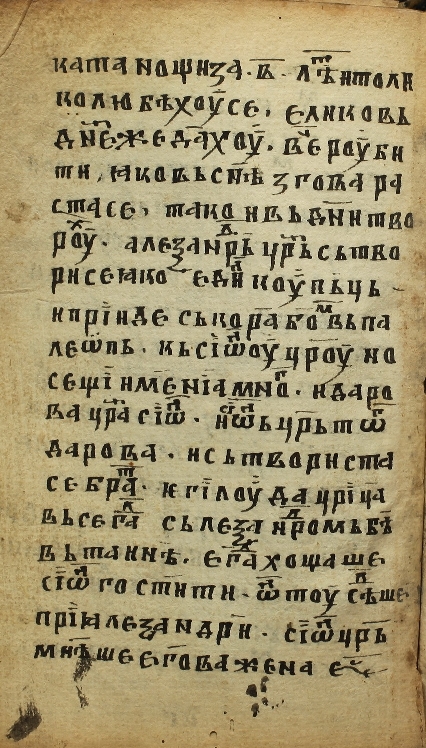 | | page 120v | | 1: | kata lemma: kata 'every'
form: adverb
nošti+ lemma: nošt 'night'
form: f.pl.nom/acc
za lemma: za 'for, about'
form: preposition
*v* lemma: 2
form: alphabetic number
ltě+ lemma: lěto 'summer, year'
form: n.pl.gen
After a '2' one would expect a dual. The pl.gen could reflect the loss of its distinctive form in BG/MK, but also a possible interference of a Greek original (the kata in the sentence makes the latter plausible too). An expectable CS form lětě is found only in the Petersburg ed.
i+ lemma: i 'and'
form: conjunction
translation: and they loved each other for 2 years every night
toli_ko lemma: toliko
form: relative
| | 2: | ljuběxú+ lemma: ljubja 'love'
form: 3pl.aor/impf (ipf)
se, lemma: se 'self'
form: refl.acc
eliko+ lemma: eliko 'as much'
form: relative
translation: so that in the day they wished (only) for the evening to come
vь lemma: v 'in'
form: preposition
| | 3: | dne+ lemma: den 'day'
form: m.sg.gen
Formally, a sg.gen for an OCS i-stem - next sentence has vь dni. Adžar: dnju
žedàxou, lemma: želaja 'desire, wish'
form: 3pl.aor/impf (ipf)
včerou+ lemma: večer 'evening'
form: m.sg.dat
bi_ti, lemma: sъm 'be'
form: infinitive (ipf)
| | 4: | jako lemma: jako (2) 'as'
form: conjunction
translation: what they agreed with each other in the dream, thus they did in the day too
vь+ lemma: v 'in'
form: preposition
sně` lemma: sъn 'slumber, dream'
form: m.sg.loc
zgovara_sta+ lemma: sgovorja 'discuss, make a plan'
form: 2dl.aor (pf)
Another trace of dual loss - CS pl.aor: 1. -xově, 2. -sta, 3. -ste (Lunt 2001:102). 3dl.aor -sta (also attested in Kiev d.) likely reflects an analogical levelling preceding the loss of distinctive dual. Veles has 3pl.impf zgovoraxu.
| | 5: | se, lemma: se 'self'
form: refl.acc
tako lemma: tako
form: relative
i+ lemma: i 'and'
form: conjunction
vь+ lemma: v 'in'
form: preposition
dni lemma: den 'day'
form: m.sg.loc
tvo_rxou. lemma: tvorja 'do, create'
form: 3pl.aor/impf (ipf)
And after a broken dual, a plural form is used for the same subject.
| | 6: | aleѯandrь´ lemma: Aleksander 'Alexander'
form: m.sg.nom
translation: Alexander disguised himself as one of the merchants
crь lemma: car 'king, emperor'
form: m.sg.nom
sьtvo_ri+ lemma: sъtvorja 'create, do'
form: 2/3sg.aor (pf)
| | 7: | se+ lemma: se 'self'
form: refl.acc
jako lemma: jako (2) 'as'
form: conjunction
edin lemma: edin 'one'
form: m.sg.nom
koupь´cь- lemma: kupec 'merchant'
form: m.sg.nom
| | 8: | i+ lemma: i 'and'
form: conjunction
translation: and he went with ships to Paleopol to King Sion, bringing much wealth
prïide lemma: priida 'come'
form: 2/3sg.aor (pf)
sь+ lemma: s 'with'
form: preposition
korábom+ lemma: korab 'ship'
form: m.sg.inst
vь+ lemma: v 'in'
form: preposition
pa_lewpь, lemma: Paleopol
form: m.sg.nom/acc
| | 9: | kь+ lemma: k 'to'
form: preposition
sïwnou lemma: Sion 'Sihon'
form: m.sg.dat
crou lemma: car 'king, emperor'
form: m.sg.dat
no_seštï lemma: nosja 'carry'
form: ptcp.prs.act
alt.analysis: f.sg.nom
The f.sg form is not congruent with Alexander, but it reflects dialectal development in MK, where this form is used as a gerund (today we would have something like *noseiḱi). Other versions have n.sg form nosešte, which seems to have acted as a gerund in some OCS sources (cf. Lunt 2001:159).
| | 10: | iménïa+ lemma: imanie
form: n.sg.gen
mngo. lemma: mnogo 'much'
form: adverb
i+ lemma: i 'and'
form: conjunction
translation: And he gave presents to King Sion
daro_va lemma: daruvam 'give a present'
form: 2/3sg.aor (ipf)
| | 11: | cra lemma: car 'king, emperor'
form: m.sg.gen/acc.anim
sïwn. lemma: Sion 'Sihon'
form: m.sg.nom
i+ lemma: i 'and'
form: conjunction
translation: and King Sion gave him presents
sïwnь lemma: Sion 'Sihon'
form: m.sg.nom
crь lemma: car 'king, emperor'
form: m.sg.nom
tgw lemma: tъ 'the'
form: m.sg.gen/acc
| | 12: | darova. lemma: daruvam 'give a present'
form: 2/3sg.aor (ipf)
i+ lemma: i 'and'
form: conjunction
translation: And they became ("made themselves") brothers
sьtvorista lemma: sъtvorja 'create, do'
form: 2dl.aor (pf)
Again a broken dual (2dl.aor form used for a 3dl subject), as in Veles.
| | 13: | se lemma: se 'self'
form: refl.acc
brta. lemma: brat 'brother'
form: m.dl.nom/acc
jegïlouda lemma: Giluda 'Giluda'
form: f.sg.nom
translation: Queen Giluda was usually with Alexander in the dream
crïcà lemma: carica 'queen'
form: f.sg.nom
| | 14: | vьsegda lemma: vsegda 'always'
form: adverb
sь+ lemma: s 'with'
form: preposition
leѯandromь+ lemma: Aleksander 'Alexander'
form: m.sg.inst
bě´ lemma: sъm 'be'
form: 2/3sg.impf (ipf)
| | 15: | vь+ lemma: v 'in'
form: preposition
taině`. lemma: taina 'secret'
form: f.sg.dat/loc
egda+ lemma: egda 'when'
form: relative
translation: when Alexander wanted to make a dinner for Sion, she sat there next to Alexander
xoštaše lemma: xotěti 'want'
form: 2/3sg.impf (ipf)
| | 16: | sïwn lemma: Sion 'Sihon'
form: m.sg.nom
cra lemma: car 'king, emperor'
form: m.sg.gen/acc.anim
gostìti. lemma: gostja 'treat as a guest'
form: infinitive (ipf)
wn lemma: on 'he'
form: m.3sg.nom
Sofia ed. seems to confuse Alexander and Giluda in this passage, thus making it seem, as if the affair was actually between Alexander and Sion. The pronoun is shortened, with the n written over the ot.
tou lemma: tu 'there'
form: relative
sděše lemma: sedja 'sit'
form: 2/3sg.impf (ipf)
| | 17: | prï lemma: s 'with'
form: preposition
jaleѯandrì. lemma: Aleksander 'Alexander'
form: m.sg.loc
sïwn+ lemma: Sion 'Sihon'
form: m.sg.nom
translation: Sion thought she was Alexander's wife
The missing refl. pronoun makes the sentence unclear (Veles has Sionu se mněše)
crь´ lemma: car 'king, emperor'
form: m.sg.nom
| | 18: | mně´še+ lemma: mněti
form: 2/3sg.impf (ipf)
egòva+ lemma: Aleksandrov 'Alexanderʹs'
form: f.sg.nom
žena lemma: žena 'woman'
form: f.sg.nom
es lemma: sъm 'be'
form: 3sg.prs (ipf)
|
|
|
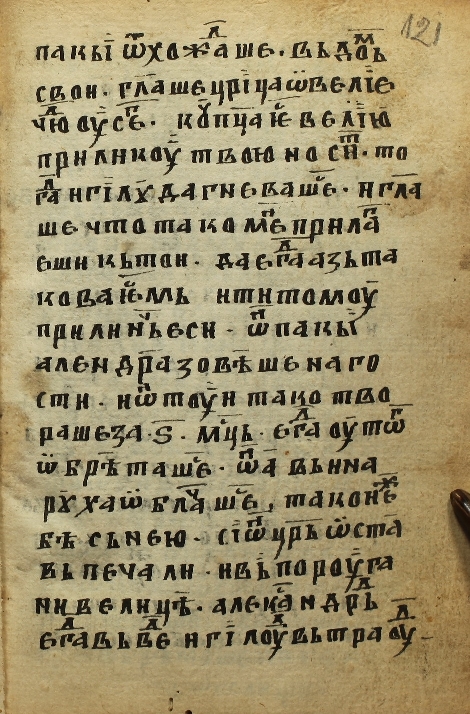 | | page 121r | | 1: | paky lemma: paki 'again'
form: adverb
translation: and she went home again
The following two sentences sound weirdly, likely because of missing (or wrongly translated) subordination markers. Cf. Veles: da egda wtxoždaše si vь domь svoi, glaše kь crci
wtxoždaše. lemma: otxoždam 'leave'
form: 2/3sg.impf (ipf)
vь+ lemma: v 'in'
form: preposition
domь lemma: dom 'house'
form: m.sg.nom/acc
| | 2: | svoi. lemma: svoi 'of oneself'
form: m.sg.nom.pron
glaše+ lemma: glagolati 'speak'
form: 2/3sg.impf (ipf)
translation: The Queen said:
crïca+ lemma: carica 'queen'
form: f.sg.nom
w+ lemma: o 'oh'
form: interjection
translation: o, what a wonder is this
velïe lemma: velii 'great'
form: n.sg.nom/acc.pron
| | 3: | čjud lemma: čudo 'miracle'
form: noun
ou lemma: u 'at'
form: preposition
translation: there is a (wife?) by this merchant
seg. lemma: sii 'this'
form: m.sg.gen/acc
kupcà lemma: kupъc
form: m.sg.gen/acc.anim
jes lemma: sъm 'be'
form: 3sg.prs (ipf)
Odessa: žena jes(t)
velïju lemma: velii 'great'
form: f.sg.acc
translation: (she) looks very similar to you
| | 4: | prilikou lemma: prilika 'looks'
form: f.sg.acc
tvoju lemma: tvoi 'your'
form: f.sg.acc.pron
nosit. lemma: nosja 'carry'
form: 3sg.prs (ipf)
to_gda lemma:
form:
translation: Giluda was very angry then
Here, the passage ceases to make sense, unless the Queen and Giluda were two persons.
| | 5: | igïlúda+ lemma: Giluda 'Giluda'
form: f.sg.nom
gnevaš(e)+ lemma: gněvati 'be angry'
form: 3sg.prs (ipf)
se. lemma: se 'self'
form: refl.acc
i+ lemma: i 'and'
form: conjunction
translation: and she said:
gla_še. lemma: glagolati 'speak'
form: 3sg.prs (ipf)
| | 6: | čto lemma: čьto
form: nom
translation: why do you associate myself thus (with him)?
mne lemma: az 'I'
form: 1sg.dat
tako lemma: tako
form: adverb
prilga_eši lemma: prilagam 'be possible, lay down, be similar, add'
form: 2sg.prs (ipf)
| | 7: | kь+ lemma: kъ
form: preposition
toi. lemma: ona 'she'
form: f.3sg.dat
da+ lemma: da 'to'
form: conjunction
translation: if I am such, then you also look like him
egda+ lemma: egda 'when'
form: relative
azь+ lemma: az 'I'
form: 1sg.nom
ta_kova lemma: takъv 'such'
form: f.sg.nom
| | 8: | jesmь lemma: sъm 'be'
form: 1sg.prs (ipf)
i+ lemma: i 'and'
form: conjunction
ti+ lemma: ty 'you'
form: 2sg.dat
alt.analysis: 2sg.nom
tomoú lemma: tъ 'the'
form: m.sg.dat
| | 9: | priličnь lemma: priličen 'similar, appropriate'
form: m.sg.nom
esi. lemma: sъm 'be'
form: 2sg.prs (ipf)
wn lemma: on 'he'
form: m.3sg.nom
translation: And he invited Alexander as a guest again
paky lemma: paki 'again'
form: adverb
| | 10: | alendrà+ lemma: Aleksander 'Alexander'
form: m.sg.gen/acc.anim
zově´še+ lemma: zvati
form: 2/3sg.impf (ipf)
na+ lemma: na 'on, to, for'
form: preposition
go_sti. lemma: gost 'guest'
form: m.pl.nom
| | 11: | i+ lemma: i 'and'
form: conjunction
translation: and he there (...)
Odessa: i ona paky tu bě
wn lemma: ona 'she'
form: f.3sg.nom
tou+ lemma: tu 'there'
form: relative
i lemma: i 'and'
form: conjunction
translation: and thus they did for 6 months
tako lemma: tako
form: relative
tvo_reše+ lemma: tvorja 'do, create'
form: 2/3sg.impf (ipf)
| | 12: | za lemma: za 'for, about'
form: preposition
*ź* lemma: 6
form: alphabetic number
Odessa: *g*
mscь. lemma: mesec 'month'
form: m.pl.gen
egda lemma: i 'and'
form: conjunction
translation: when he appeared there,
The passage is unclear in all included editions. Likely some specific phrase trying to explain how Alexander (actually, here it looks like it was Gulida) changed his identity. No clearer in Veles (kogda u tog).
ou lemma: u 'at'
form: preposition
tgw lemma: tъ 'the'
form: m.sg.gen/acc
| | 13: | wbrě´taš(e)+ lemma: obrěsti 'find'
form: 2/3sg.impf (ipf)
se. lemma: se 'self'
form: refl.acc
wnà lemma: i 'and'
form: conjunction
translation: she clad himself in different clothes
vь+ lemma: v 'in'
form: preposition
ina lemma: in 'another, different'
form: n.pl.nom/acc
| | 14: | rúxa+ lemma: ruxo 'clothing, mantle'
form: n.pl.nom/acc
prěměnjaš(e) lemma: premenja 'change clothes'
form: 2/3sg.impf (ipf)
se. lemma: se 'self'
form: refl.acc
tako+ lemma: tako
form: adverb
translation: and thus he was with her
Actually not written how! The story of how he wooed her into a ship, known from Veles (and Adžar) ed. is missing also in Bucharest, Petersburg and Sofia texts.
iže lemma: iže 'who'
form: m.sg.nom/acc
| | 15: | bě lemma: sъm 'be'
form: 2/3sg.impf (ipf)
sь+ lemma: s 'with'
form: preposition
neju. lemma: tja 'she'
form: f.3sg.inst
sïwn lemma: Sion 'Sihon'
form: m.sg.nom
translation: King Sion remained in sorrow and great shame
In Veles, this sentence appears first after the account of an earthquake in Troas following the entrance of Giluda.
crь lemma: car 'king, emperor'
form: m.sg.nom
wstà lemma: ostana 'remain'
form: 2/3sg.aor (pf)
| | 16: | vь+ lemma: v 'in'
form: preposition
pěčali. lemma: pečal 'sorrow'
form: f.sg.gen
i+ lemma: i 'and'
form: conjunction
vь+ lemma: v 'in'
form: preposition
porouga_ni+ lemma: poruganie 'derision'
form: n.sg.loc
| | 17: | velicě`. lemma: veliko 'greatly'
form: adverb
aleѯandrdь lemma: Aleksander 'Alexander'
form: m.sg.nom
translation: when Alexander brought Giluda into the city of Troas, the city was shaken strongly
| | 18: | egda+ lemma: egda 'when'
form: relative
vьvde lemma: vъveda 'lead in'
form: 2/3sg.aor (pf)
igïldou lemma: Giluda 'Giluda'
form: f.sg.acc
vь+ lemma: v 'in'
form: preposition
tradou- lemma: Troada 'Troas'
form: f.sg.acc
|
|
|
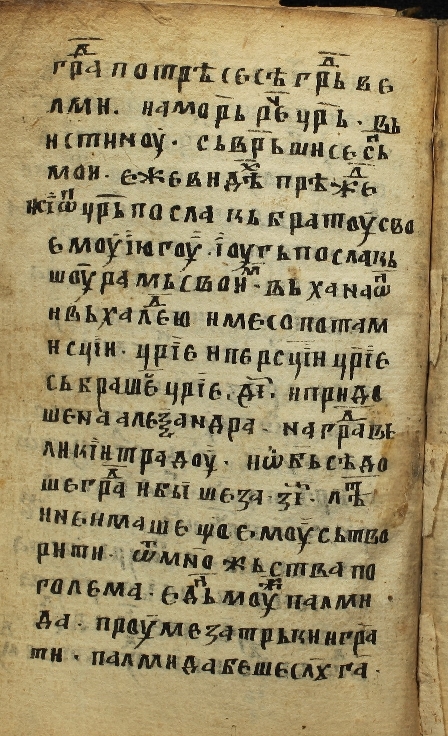 | | page 121v | | 1: | grad+ lemma: grad 'city'
form: m.sg.nom/acc
potrěse+ lemma: potresa 'shake a little'
form: 2/3sg.aor (pf)
sě lemma: se 'self'
form: refl.acc
grdь lemma: grad 'city'
form: m.sg.nom/acc
ve_lmi. lemma: velmi
form: adverb
| | 2: | iamorь` lemma: Amor
form: m.sg.nom
translation: and King (A)mor said:
rče lemma: reka 'say'
form: 2/3sg.aor (pf)
crь. lemma: car 'king, emperor'
form: m.sg.nom
vь lemma: v 'in'
form: preposition
translation: truly, the dream I saw earlier is fulfilled
| | 3: | istinoú. lemma: istina 'truth'
form: f.sg.acc
sьvrь`ši+ lemma: sъvъrša 'finish'
form: 2/3sg.aor (pf)
se+ lemma: se 'self'
form: refl.acc
sьn lemma: sъn 'slumber, dream'
form: m.sg.nom/acc
| | 4: | moi. lemma: moi 'my'
form: m.sg.nom.pron
eže+ lemma: iže 'who'
form: n.sg.nom
viděx lemma: vidja 'see'
form: 1sg.aor (ipf)
prěžde lemma: prěžde
form: adverb
| | 5: | i+ lemma:
form:
translation: and King Sion sent for his brother Jug
sïwn lemma: Sion 'Sihon'
form: m.sg.nom
crь+ lemma: car 'king, emperor'
form: m.sg.nom
posla+ lemma: poslati 'send'
form: 2/3sg.aor (pf)
kь+ lemma: k 'to'
form: preposition
bratoú+ lemma: brat 'brother'
form: m.sg.dat
svo_emou+ lemma: svoi 'of oneself'
form: m.sg.dat.pron
| | 6: | ïjugou. lemma: Jug 'Og'
form: m.sg.dat
ïougь+ lemma: Jug 'Og'
form: m.sg.nom
translation: Jug sent for his brothers in law in Canaan and Chaldea and Mesopotamia
posla+ lemma: poslati 'send'
form: 3sg.prs (ipf)
kь lemma: k 'to'
form: preposition
| | 7: | šoúramь+ lemma: šurei
form: m.pl.dat
Odessa: šuremь
svoim. lemma: svoi 'of oneself'
form: m.pl.dat.pron
vь+ lemma: v 'in'
form: preposition
xanawn lemma: Xanaan 'Canaan'
form: m.sg.nom/acc
| | 8: | i+ lemma: i 'and'
form: conjunction
vь+ lemma: v 'in'
form: preposition
xaldeju lemma: Xaldeja
form: f.sg.acc
i+ lemma: i 'and'
form: conjunction
mesopotam_iscïi. lemma: mesopotamski
form: m.pl.nom.pron
translation: and the Mesopotamian and Persian kings assembled each other, 14 kings
| | 9: | crïe lemma: car 'king, emperor'
form: m.pl.acc/inst
i+ lemma: i 'and'
form: conjunction
perscïi+ lemma: persiiski 'Persian'
form: m.pl.nom.pron
crïe lemma: car 'king, emperor'
form: m.pl.acc/inst
| | 10: | sьbraše+ lemma: sъbera 'collect'
form: 3pl.aor (pf)
s(e) lemma: se 'self'
form: refl.acc
crïe lemma: car 'king, emperor'
form: m.pl.acc/inst
*dı* lemma: 14
form: alphabetic number
i+ lemma: i 'and'
form: conjunction
translation: and they came against King Alexander and the great city of Troas
prido_še lemma: pride
form: 3pl.aor (pf)
| | 11: | na lemma: na 'on, to, for'
form: preposition
aleѯandra. lemma: Aleksander 'Alexander'
form: m.sg.gen/acc.anim
na lemma: na 'on, to, for'
form: preposition
grad+ lemma: grad 'city'
form: m.sg.nom/acc
ve_likïi lemma: velik 'great'
form: m.sg.nom.pron
| | 12: | tradou. lemma: Troada 'Troas'
form: f.sg.acc
i+ lemma: i 'and'
form: conjunction
translation: and they besieged it
wbьsědo_še+ lemma: obsadja 'besiege'
form: 3pl.aor (pf)
| | 13: | grad lemma: grad 'city'
form: m.sg.nom/acc
i+ lemma: i 'and'
form: conjunction
translation: And they fought for 17 years
byše+ lemma: ratovati
form: 3pl.aor (pf)
za lemma: za 'for, about'
form: preposition
*zı* lemma: 17
form: alphabetic number
lět lemma: leto
form: n.pl.gen
| | 14: | i+ lemma: i 'and'
form: conjunction
translation: and they were not able to finish anything because of the larger number (of forces)
ne+ lemma: ne 'no, not'
form: negation particle
imaše lemma: imam 'have'
form: 2/3sg.impf (ipf)
što+ lemma: što 'what'
form: interrogative
emou+ lemma: toi 'he'
form: m.3sg.dat
sьtvo_riti. lemma: sъtvorja 'create, do'
form: infinitive (pf)
| | 15: | wt+ lemma: s 'with'
form: preposition
mnòžьstva lemma: množestvo 'multitude'
form: n.sg.gen
po lemma: po (2) '(comparative particle)'
form: degree particle
| | 16: | golema. lemma: polema
form: n.sg.gen
ednь+ lemma: edin 'one'
form: m.sg.nom
translation: (There was) a man (called) Palmida.
Odessa: edinь imenem palmida běše sluga ioga cra
mouž+ lemma: mъž 'man'
form: m.sg.nom
palmi_da. lemma: Palmida 'Palamedes'
form: f.sg.nom
| | 17: | proume+ lemma: prouměti
form: 2/3sg.aor (pf)
translation: He invented to play dice
zatrьki+ lemma: zatrik
form: m.pl.nom
igra_ti. lemma: igraja 'dance, play'
form: infinitive (ipf)
| | 18: | palmida+ lemma: Palmida 'Palamedes'
form: f.sg.nom
translation: Palmida was a servant of King Jug.
This sentence is placed before the previous one in other editions.
beše+ lemma: sъm 'be'
form: 2/3sg.impf (ipf)
slúgá. lemma: sluga 'servant'
form: f.sg.nom
|
|
|
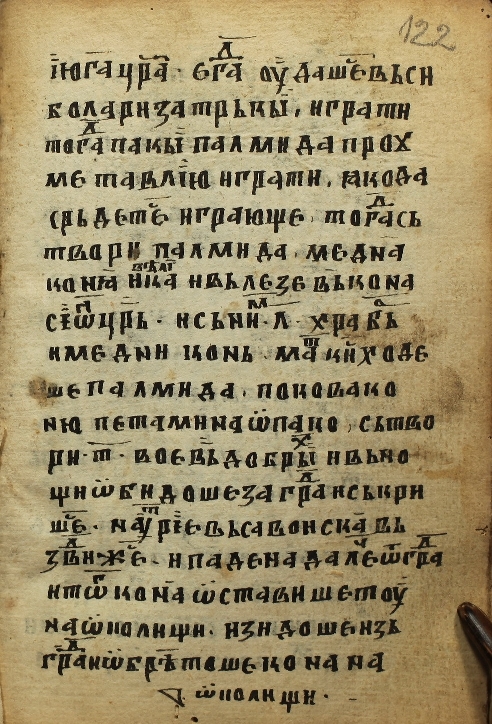 | | page 122r | | 1: | ïjugà+ lemma: Jug 'Og'
form: m.sg.gen/acc.anim
cra. lemma: car 'king, emperor'
form: m.sg.gen/acc.anim
egda lemma: egda 'when'
form: relative
translation: when all boyars put themselves to play dice
oudaše+ lemma: udati
form: 3pl.aor (pf)
Miklosich: oudati 'tradere, dare'
s(e)+ lemma: se 'self'
form: refl.acc
vьsi lemma: vsi
form: m.pl.nom
| | 2: | bolari+ lemma: boljar
form: m.pl.nom
zatrьky, lemma: zatrik
form: m.pl.nom
igrati lemma: igraja 'dance, play'
form: infinitive (ipf)
| | 3: | togda+ lemma: togda 'then'
form: relative
translation: then Palmida invented backgammon, to make them angry by the game
paky+ lemma: pak 'again'
form: adverb
palmida+ lemma: Palmida 'Palamedes'
form: f.sg.nom
prou_me lemma: prouměti
form: 2/3sg.aor (pf)
| | 4: | tavlïju lemma: tavlija
form: f.sg.acc
igrati, lemma: igraja 'dance, play'
form: infinitive (ipf)
jako+ lemma: jako (2) 'as'
form: conjunction
da lemma: da 'to'
form: conjunction
The subordinate clause differs in Veles, but both variants make little sense.
| | 5: | srьdet+ lemma: sъrdja 'be angry'
form: 3pl.prs (ipf)
se lemma: se 'self'
form: refl.acc
igrajušte, lemma: igraja 'dance, play'
form: ptcp.prs.act
alt.analysis: m.pl.nom
togda+ lemma: togda 'then'
form: relative
translation: and again, Palmida crafted a very big copper (bronze?) horse
sь_tvori lemma: sъtvorja 'create, do'
form: 2/3sg.aor (pf)
| | 6: | palmida, lemma: Palmida 'Palamedes'
form: f.sg.nom
mednà lemma: měden 'of copper'
form: m.sg.gen/acc
konjà lemma: kon 'horse'
form: m.sg.gen/acc.anim
med'na lemma: měden 'of copper'
form: m.sg.gen/acc
| | 7: | vělikag lemma: velii 'great'
form: m.sg.gen/acc
i+ lemma: i 'and'
form: conjunction
translation: and King Sion entered the copper horse and with him 30 brave (warriors)
vьleze. lemma: vljaza
form: 2/3sg.aor (pf)
vь+ lemma: v 'in'
form: preposition
kona lemma: kon 'horse'
form: m.sg.gen/acc.anim
| | 8: | sïwn+ lemma: Sion 'Sihon'
form: m.sg.nom
crь. lemma: car 'king, emperor'
form: m.sg.nom
i+ lemma: i 'and'
form: conjunction
sь+ lemma: s 'with'
form: preposition
nim lemma: toi 'he'
form: m.3sg.inst
*l* lemma: 30
form: alphabetic number
A substantive seems to be omitted, cf. Veles: *l* voe dobri i xrabri
xrabrь lemma: xrabъr 'brave'
form: m.pl.gen
| | 9: | i+ lemma: a 'and, but'
form: conjunction
translation: and the copper horse walked by himself (?)
medni lemma: měden 'of copper'
form: m.sg.nom.pron
konь lemma: kon 'horse'
form: m.sg.nom
matski+ lemma: imatski
form: adverb
The adverb (Veles: imatnski, Odessa: maѳataskïi, Bucharest: matatokyi, Petersburg: matatatokyi, Sofia: matski, Adžar: matan'ski) was likely, like polema, simply left untranslated, perplexing scholars since the discovery of the Tale. Syrku (1884:86) translates it as equus hic automatus movebatur 'the horse moved automatically', constructing the Greek source as metatopizomenos, lit. 'changing place'. Mazon (1942:38) reconstructs the original word as metakınētós or metáѳetos 'déplaçable'.
xode_še+ lemma: xoždam 'walk, travel'
form: 2/3sg.impf (ipf)
| | 10: | palmida, lemma: Palmida 'Palamedes'
form: f.sg.nom
translation: Palmida put horseshoes on the horses
pokova+ lemma: podkovati
form: 2/3sg.aor (pf)
ko_nju lemma: kon 'horse'
form: m.sg.dat
Adžar: kone, Odessa: konja
| | 11: | petami+ lemma: peta 'heel'
form: f.pl.inst
The nature of Palmida's ruse gets lost in this edition. Cf. Veles: naopaku peldami
nawpako, lemma: paki 'again'
form: adverb
alt.analysis: m.sg.def
sьtvo_ri lemma: i 'and'
form: conjunction
translation: and he selected 300 good warriors
| | 12: | *t* lemma: 300
form: alphabetic number
An allusion to Thermopylae?
voevь+ lemma: voi
form: m.pl.gen
dobryx lemma: dobъr 'good'
form: m.pl.gen/loc.pron
i+ lemma: i 'and'
form: conjunction
translation: and they went away at night
vь+ lemma: v 'in'
form: preposition
no_šti+ lemma: nošt 'night'
form: f.sg.dat/loc
| | 13: | wbidoše+ lemma: obida 'go around'
form: 3pl.aor (pf)
za+ lemma: zad 'behind'
form: preposition
grad+ lemma: grad 'city'
form: m.sg.nom/acc
i+ lemma: i 'and'
form: conjunction
translation: and they hid
Details of movements of Palmida's army are not in Odessa ed.
sьkri_še+ lemma: skrija 'hide'
form: 3pl.aor (pf)
| | 14: | s(e). lemma: se 'self'
form: refl.acc
na+ lemma: na 'on, to, for'
form: preposition
translation: in the morning, the whole army stood up
(ou)trïe+ lemma: utre 'morning'
form: adverb
vьsa+ lemma: vse 'all'
form: f.sg.nom
voiská lemma: voiska 'army'
form: f.sg.nom
alt.analysis: n.pl.nom/acc
vь_zdviže+ lemma: vъzdvigna 'lift'
form: 2/3sg.aor (pf)
| | 15: | s(e). lemma: se 'self'
form: refl.acc
i+ lemma: i 'and'
form: conjunction
translation: and it moved away from the city
pade+ lemma: pasti 'fall'
form: 2/3sg.aor (pf)
na+ lemma: na 'on, to, for'
form: preposition
dalče+ lemma: daleče 'far'
form: adverb
wt+ lemma: ot 'from'
form: preposition
grad lemma: grad 'city'
form: m.sg.nom/acc
Thus in all versions. The writing is graphically the same as directional vь grad below.
| | 16: | i+ lemma: i 'and'
form: conjunction
translation: and they left the horse around
tgw lemma: tъ 'the'
form: m.sg.gen/acc
konà lemma: kon 'horse'
form: m.sg.gen/acc.anim
wstaviše+ lemma: ostavja 'leave'
form: 3pl.aor (pf)
tou lemma: tu 'there'
form: relative
na+ lemma: na 'on, to, for'
form: preposition
| | 17: | wkolišti. lemma: okolište 'surroundings'
form: n.sg.loc
izidoše+ lemma: izida 'go out'
form: 3pl.aor (pf)
translation: and they went away from the city
izь lemma: ot 'from'
form: preposition
| | 18: | grad+ lemma: grad 'city'
form: m.sg.nom/acc
Again, sg.gen would be expected after an ot.
i+ lemma: i 'and'
form: conjunction
translation: and they found the horse in the vicinity
wbrě´toše+ lemma: obrěsti 'find'
form: 3pl.aor (pf)
kona+ lemma: kon 'horse'
form: m.sg.gen/acc.anim
na lemma: na 'on, to, for'
form: preposition
wkolïštïi. lemma: okolište 'surroundings'
form: n.sg.loc
|
|
|
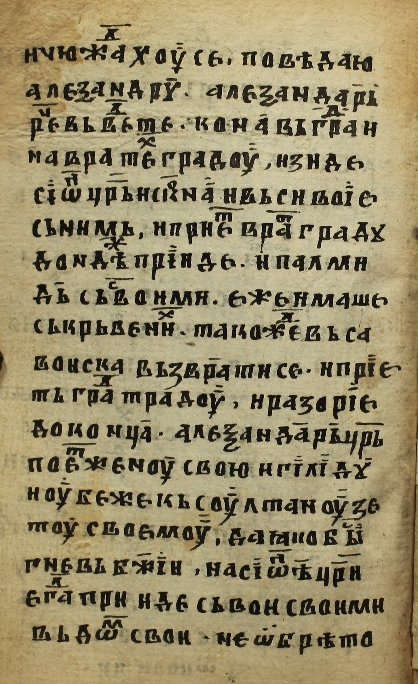 | | page 122v | | 1: | i+ lemma: i 'and'
form: conjunction
translation: and they wondered
čjuždaxu lemma: čudja 'wonder'
form: 3pl.aor/impf (ipf)
se. lemma: se 'self'
form: refl.acc
povědaju lemma: povědati 'tell'
form: Vmia
translation: and they told Alexander
The morphological form is unclear, mostly resembles a 1sg.prs
| | 2: | aleѯandrú. lemma: Aleksander 'Alexander'
form: m.sg.dat
aleѯandarь` lemma: Aleksander 'Alexander'
form: m.sg.nom
translation: Alexander said:
| | 3: | rče+ lemma: reka 'say'
form: 2/3sg.aor (pf)
vьvdete. lemma: vъveda 'lead in'
form: 2pl.imp (pf)
translation: bring the horse into the city
konà+ lemma: kon 'horse'
form: m.sg.gen/acc.anim
vь+ lemma: v 'in'
form: preposition
grad+ lemma: grad 'city'
form: m.sg.gen
i+ lemma: i 'and'
form: conjunction
translation: and at the gates of the city, King Sion and all the warriors came out of the horse
| | 4: | na+ lemma: na 'on, to, for'
form: preposition
vratex lemma: vrata 'door'
form: n.pl.loc
gradou, lemma: grad 'city'
form: m.sg.dat
izide lemma: izida 'go out'
form: 2/3sg.aor (pf)
| | 5: | sïwn+ lemma: Sion 'Sihon'
form: m.sg.nom
crь+ lemma: car 'king, emperor'
form: m.sg.nom
is+ lemma: iz 'from'
form: preposition
kona lemma: kon 'horse'
form: m.sg.gen/acc.anim
i+ lemma: i 'and'
form: conjunction
vьsi lemma: vse 'all'
form: m.pl.nom
voïe lemma: voin 'warrior'
form: m.pl.nom
| | 6: | sь+ lemma: s 'with'
form: preposition
nimь, lemma: toi 'he'
form: m.3sg.inst
i+ lemma: i 'and'
form: conjunction
translation: and they took the gates of the city
priet lemma: prięti
form: 2/3sg.aor (pf)
vrat+ lemma:
form:
gradu lemma: grad 'city'
form: m.sg.dat
| | 7: | donděž lemma: dondeže
form: relative
translation: until Palmida came with his (forces), which were hidden
prïide. lemma: priida 'come'
form: 2/3sg.aor (pf)
i+ lemma: i 'and'
form: conjunction
palmi_dь´ lemma: Palmida 'Palamedes'
form: m.sg.nom
alt.analysis: f.sg.def
| | 8: | sь+ lemma: s 'with'
form: preposition
svoimi. lemma: svoi 'of oneself'
form: m.pl.inst.pron
eže+ lemma: iže 'who'
form: m.pl.acc
< *ęže ?
imaše lemma: imam 'have'
form: 2/3sg.impf (ipf)
| | 9: | sьkrьvenix. lemma: skrija 'hide'
form: m.pl.gen/loc.pron
alt.analysis: ptcp.aor.pass (pf)
takožde+ lemma: takožde 'in the same way'
form: relative
translation: thus the whole army came back
vьsa lemma: vse 'all'
form: f.sg.nom
| | 10: | voiska lemma: voiska 'army'
form: f.sg.nom
alt.analysis: n.pl.nom/acc
vьzvràti+ lemma: vъzvratiti 'return'
form: 2/3sg.aor (pf)
se. lemma: se 'self'
form: refl.acc
i+ lemma: i 'and'
form: conjunction
translation: and they took the city of Troas
prïe_tь lemma: priema 'accept, receive'
form: 2/3sg.aor (pf)
| | 11: | grad lemma: grad 'city'
form: m.sg.nom/acc
tradou, lemma: Troada 'Troas'
form: f.sg.acc
i+ lemma: i 'and'
form: conjunction
translation: and they destroyed it utterly
razorï+ lemma: razvalja 'destroy'
form: 2/3sg.impf (ipf)
e lemma: toi 'he'
form: n.3sg.gen/acc (long)
Odessa: ego
| | 12: | do+ lemma: do 'until'
form: preposition
koncà. lemma: konec 'end'
form: m.sg.gen
aleѯandàrь`+ lemma: Aleksander 'Alexander'
form: m.sg.nom
translation: and Alexander took his wife Giluda and left the city at night
crь lemma: car 'king, emperor'
form: m.sg.nom
| | 13: | poet+ lemma: poęti
form: 2/3sg.aor (ipf)
ženoú lemma: žena 'woman'
form: f.sg.acc
svoju lemma: svoi 'of oneself'
form: f.sg.acc.pron
igïlïdú lemma: Giluda 'Giluda'
form: f.sg.acc
| | 14: | i lemma: i 'and'
form: conjunction
translation: and he ran away to Sultan, his son in law, into Saracenia
oubeže+ lemma: uběgam
form: 2/3sg.aor (pf)
kь+ lemma: k 'to'
form: preposition
soultanou+ lemma: Sultan
form: m.sg.dat
ze_tou lemma: zet 'son in law'
form: m.sg.dat
| | 15: | svoemu, lemma: svoi 'of oneself'
form: m.sg.dat.pron
da+ lemma: ta 'and, thus'
form: conjunction
translation: for there was God's anger against King Sion
jako+ lemma: jako (2) 'as'
form: conjunction
bys lemma: sъm 'be'
form: 2/3sg.aor (ipf)
| | 16: | gnevь+ lemma: gněv 'anger'
form: m.sg.nom/acc
bžïi, lemma: božii 'Godʹs'
form: m.sg.nom.pron
na+ lemma: na 'on, to, for'
form: preposition
sïwně´+ lemma: Sion 'Sihon'
form: m.sg.loc
Adžar: na siona cra
cri lemma: car 'king, emperor'
form: m.sg.loc
| | 17: | egda+ lemma: egda 'when'
form: conjunction
translation: when he returned to his home with his warriors, they did not find (anything?) in their houses
pri_ide lemma: priida 'come'
form: 2/3sg.aor (pf)
sь lemma: s 'with'
form: preposition
voi lemma: voin 'warrior'
form: m.pl.acc/inst
svoimi lemma: svoi 'of oneself'
form: m.pl.inst.pron
| | 18: | vь+ lemma: v 'in'
form: preposition
dwm lemma: dom 'house'
form: m.sg.nom/acc
svoi, lemma: svoi 'of oneself'
form: m.sg.nom.pron
ne+ lemma: ne 'no, not'
form: negation particle
wbrěto_še lemma: obrěsti 'find'
form: 3pl.aor (pf)
|
|
|
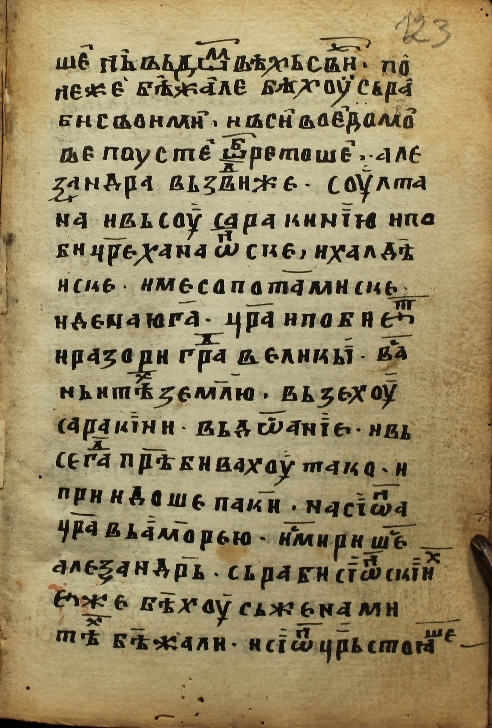 | | page 123r | | 1: | nь`+ lemma: nъ
form: conjunction
Odessa: ženi
vь+ lemma: v 'in'
form: preposition
dmwvěxь+ lemma: dom 'house'
form: m.pl.loc
svix. lemma: svoi 'of oneself'
form: m.pl.gen/loc.pron
po_neže lemma: poneže 'because'
form: conjunction
translation: because they ran with their servants
| | 2: | bě´žále lemma: běgam 'run'
form: l-ptcp (ipf)
Odessa: bežalï
běxou+ lemma: sъm 'be'
form: Vaia3pi
sь+ lemma: s 'with'
form: preposition
rá_bi+ lemma: rab 'servant, slave'
form: m.pl.nom
The pl.inst form differs in Veles and Odessa versions. Veles prefers -mi, which goes back to OCS u-stem ending -ъmi, while Odessa prefers -i (although it also has e.g. korabmi). This would be a regular reflex of OCS o/jo-stem ending -y, but it also may reflect a generalized pl.nom ending.
| | 3: | svoimì. lemma: svoi 'of oneself'
form: m.pl.inst.pron
i+ lemma: i 'and'
form: conjunction
translation: and all the warriors found their houses deserted
vьsi lemma: vse 'all'
form: m.pl.nom
voè lemma: voin 'warrior'
form: m.pl.nom
domò_ve lemma: dom 'house'
form: m.pl.nom
| | 4: | poustè lemma: pust 'deserted'
form: m.pl.acc/inst
SC?
wbretošè lemma: obrěsti 'find'
form: 3pl.aor (pf)
aleѯandra lemma: Aleksander 'Alexander'
form: m.sg.gen/acc.anim
translation: and Alexander took Sultan and all the forces of Saracenes
vьzdviže. lemma: vъzdvigna 'lift'
form: particle
soulta_na lemma: Sultan
form: m.sg.gen/acc.anim
| | 5: | i+ lemma: i 'and'
form: conjunction
vьsou lemma: vse 'all'
form: f.sg.acc
sarakinïju lemma: Sarakinija
form: f.sg.acc
i+ lemma: i 'and'
form: conjunction
translation: and he slew all the kings of Canaan, Mesopotamia and Chaldea
po_bi lemma: pobija 'beat a little, kill'
form: 2/3sg.aor (pf)
| | 6: | cre+ lemma: car 'king, emperor'
form: m.pl.acc/inst
xanawnske, lemma: xanaanski 'of Canaan'
form: m.pl.acc.pron
Adžar and Odessa have -ie, formally closer to the regular CS hard-stem m.pl.acc (< *-yę), but -e is still productive in SC.
i+ lemma: i 'and'
form: conjunction
xaldě´_iske. lemma: xaldeiski
form: m.pl.acc.pron
| | 7: | i+ lemma: i 'and'
form: conjunction
mesopotámiske. lemma: mesopotamski
form: m.pl.acc.pron
| | 8: | ide+ lemma: ida 'go'
form: 2/3sg.aor (pf)
translation: he went against King Jug
na+ lemma: na 'on, to, for'
form: preposition
jugá. lemma: Jug 'Og'
form: m.sg.gen/acc.anim
crà lemma: car 'king, emperor'
form: m.sg.gen/acc.anim
i+ lemma: i 'and'
form: conjunction
translation: and he killed him
pobiet lemma: ubija 'murder, kill'
form: 2/3sg.aor (pf)
| | 9: | i+ lemma: i 'and'
form: conjunction
translation: And he destroyed the great city of Vasan
razory lemma: razorja 'destroy'
form: 2/3sg.aor (pf)
grad lemma: grad 'city'
form: m.sg.nom/acc
veliky. lemma: velik 'great'
form: m.sg.nom
vas_nь+ lemma: Vasan 'Bashan'
form: m.sg.nom/acc
| | 10: | i+ lemma: i 'and'
form: conjunction
translation: and the (nation of) Saracenes took their land for their own
těx lemma: tě 'they'
form: 3pl.gen/acc (long)
zemljù. lemma: zemlja 'land, earth'
form: f.sg.acc
vьzexou lemma: vzema 'take'
form: 2/3sg.impf (pf)
Here, the use of 3pl.impf on a perfective verb does not have an iterative sense like usually in CS, but rather shows the generalization of the ending for aorist tense - as commonly attested by damaskini. Veles has a 3sg.aor vъzet.
| | 11: | sarakïni. lemma: sarakinin
form: m.pl.nom
vь+ lemma: v 'in'
form: preposition
dwsanïe. lemma: dostojanie 'worth, inheritance'
form: n.sg.nom/acc
i+ lemma: i 'and'
form: conjunction
translation: and they lived there forever (?)
vь_segda lemma: vsegda 'always'
form: adverb
| | 12: | prě`bivaxou lemma: prěbyvati 'dwell, last'
form: 3pl.aor/impf (ipf)
tako. lemma: tako
form: relative
i+ lemma: i 'and'
form: conjunction
translation: and they came to King Sion to Morea
| | 13: | priidoše lemma: priida 'come'
form: 3pl.aor (pf)
pakì. lemma: paki 'again'
form: adverb
na+ lemma: na 'on, to, for'
form: preposition
sïwna lemma: Sion 'Sihon'
form: m.sg.gen/acc.anim
| | 14: | cra+ lemma: car 'king, emperor'
form: m.sg.gen/acc.anim
vь+ lemma: v 'in'
form: preposition
amòreju. lemma: Morea
form: f.sg.acc
Odessa: moureu. Adžar has vь amorei.
i+ lemma: i 'and'
form: conjunction
translation: and Alexander made peace with servants of Sion, who ran away with wives (and) children (of his warriors?)
smiriše+ lemma: smirja 'attain peace'
form: 2/3sg.aor (pf)
s(e) lemma: se 'self'
form: refl.acc
| | 15: | aleѯandrь`. lemma: Aleksander 'Alexander'
form: m.sg.nom
sь+ lemma: s 'with'
form: preposition
rabi+ lemma: rab 'servant, slave'
form: m.pl.nom
sïwnskïix lemma: sionski 'of Sihon/Zion'
form: m.pl.gen/loc.pron
A rare case discord with an instrumental of the noun (Adžar/Odessa: sionskimi).
| | 16: | eže lemma: eže
form: n.sg.nom
bě´xoú lemma: sъm 'be'
form: 3pl.aor/impf (ipf)
sь+ lemma: s 'with'
form: preposition
ženami lemma: žena 'woman'
form: f.pl.inst
| | 17: | těx lemma: tě 'they'
form: 3pl.gen/acc (long)
bě´žali. lemma: běgam 'run'
form: l-ptcp (ipf)
alt.analysis: m.pl.nom
i+ lemma: i 'and'
form: conjunction
sïwn+ lemma: Sion 'Sihon'
form: m.sg.nom
translation: King Sion stood in Paleopolis
crь+ lemma: car 'king, emperor'
form: m.sg.nom
stojaše lemma: stoja 'stand'
form: 2/3sg.impf (ipf)
|
|
|
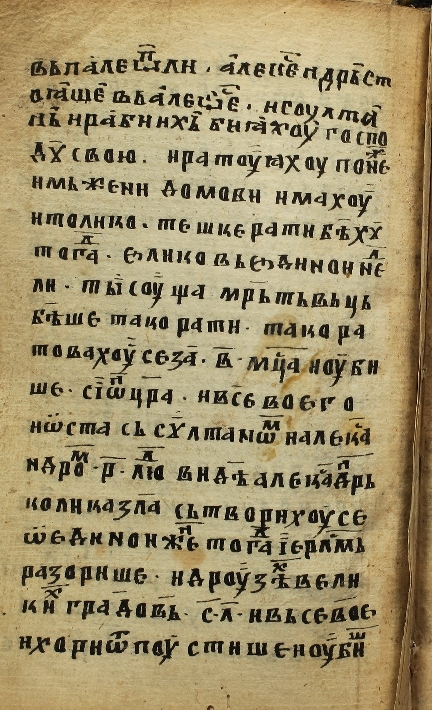 | | page 123v | | 1: | vь+ lemma: v 'in'
form: preposition
palepwli. lemma: Paleopol
form: m.sg.loc
aleksendrь`+ lemma: Aleksander 'Alexander'
form: m.sg.nom
translation: Alexander stood in Eleon
st_ojàšè lemma: stoja 'stand'
form: 2/3sg.impf (ipf)
| | 2: | vь+ lemma: v 'in'
form: preposition
alewse. lemma: Eleos
form: m.sg.loc
i+ lemma: a 'and, but'
form: conjunction
translation: and Sultan and their servants fought with their masters
soultà_nь` lemma: Sultan
form: m.sg.nom
| | 3: | i+ lemma: i 'and'
form: conjunction
rábi+ lemma: rab 'servant, slave'
form: m.pl.nom
ixь` lemma: tě 'they'
form: 3pl.gen/acc (short)
bijáxoú lemma: bija 'beat'
form: 3pl.aor/impf (ipf)
gospo_dú+ lemma: gospoda
form: f.sg.acc
A plurale tantum gospoda ?
Adžar: gsnьmi, Odessa: gospodini
| | 4: | svoju. lemma: svoi 'of oneself'
form: f.sg.acc
i+ lemma: i 'and'
form: conjunction
translation: and they were making war
ratoujaxou lemma: ratovati
form: 3pl.aor/impf (ipf)
ponež lemma: poneže 'because'
form: conjunction
translation: because they had their wives and their houses
| | 5: | imь+ lemma: tě 'they'
form: 3pl.dat
ženi lemma: žena 'woman'
form: f.pl.nom/acc
domovi lemma: dom 'house'
form: m.pl.nom
imaxou lemma: imam 'have'
form: 3pl.aor/impf (ipf)
| | 6: | i lemma: i 'and'
form: conjunction
translation: and thus it was fought for 2 months
toliko. lemma: tako
form: relative
teške+ lemma: težъk 'heavy'
form: m.pl.acc/inst
SC?
rati+ lemma: rat 'battle, war'
form: m.pl.nom
bě´xú lemma: sъm 'be'
form: 3pl.aor/impf (ipf)
| | 7: | togda. lemma: togda 'then'
form: relative
eliko lemma: eliko 'as much'
form: relative
translation: for there were thousand of dead per one week
Not in Odessa. We find a similar passage in Veles and Adžar ed., where the war is longer and more intense from the aspect of casualties: tisuštь mrьtvi givaxu za *i* mca na dnь 'a thousand of dead falling for 8 months each day'
vь+ lemma: v 'in'
form: preposition
edinoi+ lemma: edin 'one'
form: f.sg.dat.pron
nde_li. lemma: nedelja 'Sunday'
form: f.sg.dat/loc
| | 8: | tysoušta lemma: tysušta
form: f.sg.nom
mrь`tьvьcь lemma: mъrtvec 'corpse (human)'
form: m.pl.gen
| | 9: | bě´še lemma: sъm 'be'
form: 2/3sg.impf (ipf)
tako lemma: tako
form: relative
translation: thus (they made?) war
rati. lemma: rat 'battle, war'
form: m.pl.nom
tako+ lemma: tako
form: relative
translation: thus they made war for 2 months
ra_tovaxou lemma: ratovati
form: 3pl.aor/impf (ipf)
| | 10: | se+ lemma: se 'self'
form: refl.acc
za lemma: za 'for, about'
form: preposition
*v* lemma: 2
form: alphabetic number
msca. lemma: mesec 'month'
form: m.dl.nom/acc
i+ lemma: i 'and'
form: conjunction
translation: and they killed King Sion and all of his warriors
oubi_še. lemma: ubija 'murder, kill'
form: 3pl.aor (pf)
| | 11: | sïwn+ lemma: Sion 'Sihon'
form: m.sg.nom
Odessa: siwna
cra. lemma: car 'king, emperor'
form: m.sg.gen/acc.anim
i+ lemma: i 'and'
form: conjunction
vse lemma: vse 'all'
form: m.pl.acc.pron
voe lemma: voin 'warrior'
form: m.pl.nom
go. lemma: toi 'he'
form: m.3sg.gen/acc (long)
| | 12: | i+ lemma: i 'and'
form: conjunction
translation: and 100 of people remained with King Sultan and Alexander
wsta lemma: ostana 'remain'
form: 2/3sg.aor (pf)
sь+ lemma:
form:
súltanwm lemma: Sultan
form: m.sg.nom
i lemma: i 'and'
form: conjunction
aleksa_ndrom lemma: Aleksander 'Alexander'
form: m.sg.inst
| | 13: | *r* lemma: 100
form: alphabetic number
ljud lemma: ljudie 'people'
form: m.pl.gen
vidě` lemma: vidja 'see'
form: 2/3sg.aor (ipf)
translation: Alexander saw, how much evil was done due to one woman
aleksándrь lemma: Aleksander 'Alexander'
form: m.sg.nom
| | 14: | kolika+ lemma: koliko
form: interrogative
zlà lemma: zlo 'evil'
form: n.sg.gen
sьtvorixou+ lemma: sъtvorja 'create, do'
form: 2/3sg.impf (pf)
se lemma:
form:
| | 15: | w+ lemma: o 'oh'
form: preposition
ednoi+ lemma: edin 'one'
form: f.sg.dat.pron
žne lemma: žena 'woman'
form: f.sg.dat/loc
togda+ lemma: togda 'then'
form: relative
translation: and then Jerusalem was destroyed too, among 230 other cities
ïerslmь lemma: Jerusalim
form: m.sg.nom/acc
| | 16: | razoriše. lemma: razorja 'destroy'
form: 3pl.aor (pf)
i+ lemma: i 'and'
form: conjunction
drouzěx+ lemma: drug 'other'
form: m.pl.gen/loc.pron
veli_kix lemma: velik 'great'
form: m.pl.gen
| | 17: | grádovь` lemma: grad 'city'
form: m.pl.gen
*sl* lemma: 230
form: alphabetic number
i+ lemma: i 'and'
form: conjunction
translation: and all the warriors (were slain)
vьse+ lemma: vse 'all'
form: m.pl.acc.pron
vóe lemma: voin 'warrior'
form: m.pl.nom
| | 18: | i+ lemma: i 'and'
form: conjunction
translation: and lands were desolated
xori+ lemma: xora 'people'
form: f.pl.nom/acc
wtpoustiše+ lemma: opustja
form: 3pl.aor (pf)
i lemma: i 'and'
form: conjunction
translation: and they killed 13 kings excluding the King of Persia (or Pisidia?)
oubiš lemma: ubija 'murder, kill'
form: 3pl.aor (pf)
|
|
|
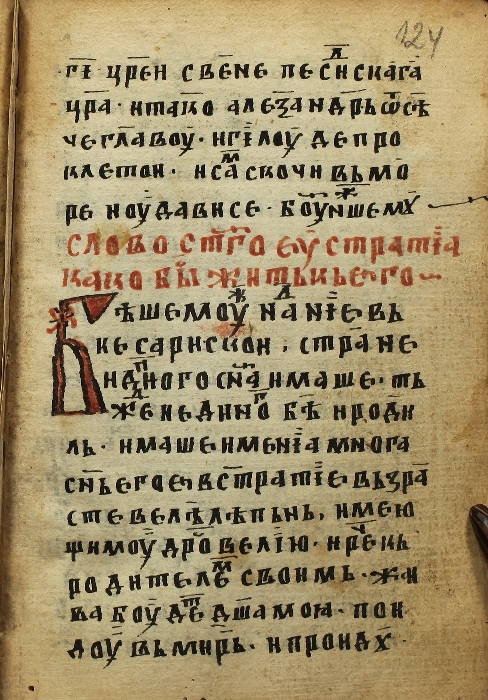 | | page 124r | | 1: | *gi* lemma: 13
form: alphabetic number
crei lemma: car 'king, emperor'
form: m.pl.gen
svéne lemma: svěně
form: preposition
pesidskágà lemma: persiiski 'Persian'
form: m.sg.gen/acc.pron
| | 2: | cra. lemma: car 'king, emperor'
form: m.sg.gen/acc.anim
i+ lemma: i 'and'
form: conjunction
translation: and thus Alexander cut off the head of accursed Giluda
takò lemma: tako
form: relative
aleѯàndrь`+ lemma: Aleksander 'Alexander'
form: m.sg.nom
wtsě´_če+ lemma: otseka 'cut off'
form: 2/3sg.aor (pf)
| | 3: | glàvu. lemma: glava 'head'
form: f.sg.acc
igïloúde+ lemma: Giluda 'Giluda'
form: f.sg.dat/loc
pro_kletoi. lemma: prokъlna 'curse'
form: f.sg.dat.pron
| | 4: | i+ lemma: a 'and, but'
form: conjunction
translation: and he himself jumped into the sea
sam lemma: sam 'alone'
form: m.sg.nom
skoči lemma: skoča 'jump'
form: 2/3sg.aor (pf)
vь+ lemma: v 'in'
form: preposition
mò_re lemma: more 'sea'
form: n.sg.nom/acc
Adžar has vь mori.
| | 5: | i+ lemma: i 'and'
form: conjunction
translation: and he drowned
oudavi+ lemma: udavja 'suffocate'
form: 2/3sg.aor (pf)
se. lemma: se 'self'
form: refl.acc
bou+ lemma: bog 'god'
form: m.sg.dat
translation: (glory be) to our God (forever)!
ž+ lemma: že 'and, also'
form: particle
nšemú lemma: naš 'our'
form: m.sg.dat.pron
|
|















